#thus far extremely effective in ending mental and emotional breakdowns
Text
I'm fine now dw
#this is not a good long term solution but weed does make me significantly less depressed#thus far extremely effective in ending mental and emotional breakdowns#''will I still want to kms if I'm high?'' the answer is always no when I'm high I want to eat dry cereal and listen to video game music#the hatsune miku pikachu song has by the power of weed restored my will to live#if I didn't care about the long term effects I'd stay high all the time tbh. so much less pain. everything is funnier. its easier to smile.#my chest doesn't hurt. nothing is scary. i simply do not care about the general state of things. brushing my teeth feels nice.#the water is soft. I have my earplugs in and the sound of my own breathing is soothing instead of annoying.#I can do anything but I have to do it extremely slowly. Thats fine. I'm not upset about people yelling at me because I don't care.#All is well. keep on keepin on. no need to think beyond tomorrow. no need to think beyond tonight.#no need to think beyond making myself safe and warm and clean and fed and cozied up with only sounds that make me happy#this is the feeling humans were created for. the feeling of being cradled by the universe thrumming in the back of our hearts.#the feeling of the vast being not uncaring but simply unaware and inherently caring in its ignorance.#water to drink soothing and aiding and fueling her creations. all is well. all is well.#there is a crack in the paint in my bathroom that looks like a super buff ant
2 notes
·
View notes
Text
Adventure, 02, pragmatism, and humanism (morality of fighting, conflict resolution, the importance of personal choice, etc.)

Adventure and 02 are naturally very idealistic series, but despite being idealistic, there are times when they can get rather pragmatic -- even uncomfortably pragmatic in ways that seem a bit unusual for a kids’ show. The entire last quarter of Adventure and almost all of 02 dealt so heavily with the topic of “is it okay to fight, even if it means incurring deaths?" to the point it’s pretty hard to miss, but both series have an approach towards the morality of fighting, the possibility of potentially having to kill enemies (including former friends that have turned antagonistic), the approach to dispute resolution, and the meanings of “moving forward positively” and “not getting hung up on needless negativity” that are surprisingly nuanced. At times, there’s even a strong message that warns against getting hung up on preachy principles that sound noble on their face but actually don’t get anywhere in practice.
This is a handful of topics, and it’s to the point where it may seem a bit strange to condense all of these under one meta instead of dedicating separate posts to it, but I decided to on the grounds of the fact that they’re all very tied to each other in the course of Adventure’s narrative. Overall, both series are very kind to the feelings and mentalities and thoughts of the young children involved, having the characters not only be kind towards each other but also encouraging the audience to understand their feelings. This is an approach towards understanding oneself and others that happens to be very applicable to life in general, even for adults; both series float a balance of being pragmatic and yet humanistic, kind to the struggles and internal thoughts of all of the characters within, and have a surprisingly nuanced look at what it means to take part in conflict and what the “best thing to do” in such a case is.
As said above, this is a long and complicated meta, and it’s to the point where I’ve considered separating it into multiple parts or posts, but in the end could never bring myself to because of how interrelated all of these topics keep ending up with each other. So, to spare those of you who are intimidated by the sheer length and winding-topic nature of this, here are the main points:
One who is not emotionally ready to fight, or is unwilling to fight, should not be forced to fight. On top of it being inhumane, emotional exhaustion is treated much in a way similar to physical exhaustion; especially in a world where fighting strength is linked to emotional will, one whose heart is not in it will not even be able to effectively fight in the first place. Even when joining the fight is the obvious ideal solution, one who needs to sit out should not be blamed or scorned for it. A choice to fight is exactly that, a choice, not an obligation; the world is messy and imperfect, and the most you can do is try to do whatever you can within the best of your ability. If you do, there is no reason you should be scorned for it.
There are many meaningful ways to contribute to the overall fight that don’t necessarily involve direct physical violence; those ways are still valuable and necessary, and those more attuned to those roles should embrace those roles if it makes them more comfortable to do it that way.
If an extreme result -- such as killing the enemy -- is reached, it needs to be done with the first and foremost priority being to protect people and prevent casualties. A diligent effort should still be made to preserve as many lives as possible (which means this isn’t something where you get to go all “knight templar” and beeline for a violent solution) -- but sometimes, there will be times when push comes to shove and that most extreme solution will have to be reached, even if that “enemy” was originally a friend, because inaction will very obviously lead to more people being hurt.
When a dispute about important points like the above is reached, everyone’s feelings must be acknowledged. This is not to be confused with philandering around with a “both sides have a point!” compromise; in fact, Adventure and 02 both make very firm stances on the above issues. Rather, it makes it clear that said points need to be made while not invalidating the other person for having those feelings -- that is to say, there’s a huge difference between “your opinion is wrong” and “you are stupid and unreasonable for having that wrong opinion.” Dispute resolution and understandings can only be reached when you properly understand why the other person came to that conclusion, and treat them with proper empathy and compassion while you try to work it out. You don’t have to acknowledge their point, but you have to acknowledge their feelings. (For those of you who have seen Appmon: Shinkai Haru is a master at this technique, and there are multiple times during the series where he will very assertively make his case against others while still appealing to the other person’s feelings and never denying their right to have them. This is also an extremely useful technique for dispute resolution in general, and I recommend that those reading this consider employing it more often, at least assuming you’re dealing with someone who’s open to listening.) Likewise, to truly reach out to someone and support them also requires understanding their feelings -- you can’t truly “support” them unless you’re capable of doing so.
There is a certain limitation in which adhering too closely to “moral principles” ends up becoming impractical, and don’t end up contributing to anything in the long run -- fixating over things like grudges, revenge, “punishing” people, and even the concept of forgiveness can quickly turn into platitudes. The best way to move forward is to not fixate on those principles or get hung up on the past, and rather think “now that we’re at this point at the current moment, what’s the best way to move forward in a way that helps others the most and minimizes harm?”
Adventure and the morality of fighting, and the necessity of personal choice
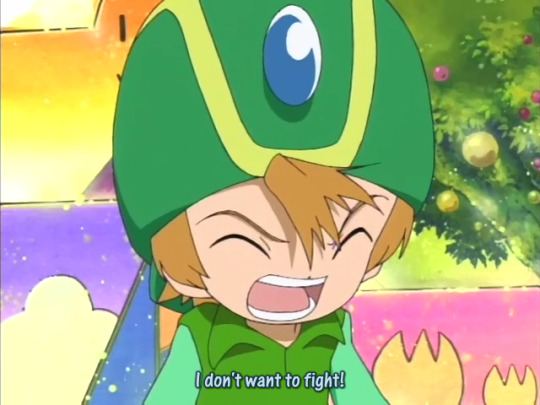
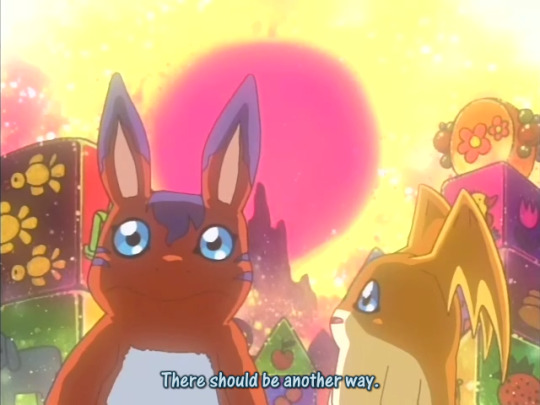

Believe it or not, the question of how feasible pacifiism is was first brought up as early as Adventure episode 12, when Takeru states that he has no intention of fighting Devimon. Elecmon calls this mindset out for the naivete of thinking they can just waltz up to Devimon and ask for answers instead of him trying to murder them on the spot -- and, in fact, he is completely right, because Devimon is not someone who can be reasoned with and indeed immediately tries to murder everyone on the spot one episode later, which results in Angemon’s death and Takeru trading out this very idealistic, naive mindset for the no-compromise, strict anti-darkness stance he takes in 02.
So there are two things to get out of this. The first is that, while Adventure and 02 are certainly very idealistic series, they are absolutely not naive. There are bad actors out there like Devimon who can’t be reasoned with whatsoever. Already off the bat, we have a clear statement from Adventure that an “everyone should stop fighting and get along!” mindset, when applied ad absurdum, is not going to get anyone very far.
The second is that none of the Adventure (or 02) kids like fighting. Takeru’s reaction here is certainly as extreme as it is because the idea of “fighting” presumably triggers his trauma from his parents’ divorce and the resulting split, but there’s no actual indication that any of these kids are necessarily fond of it. Certain ones like Taichi might get a little cocky midway through the battle when they’ve gotten it in the bag and are on an adrenaline high, but there’s also no indication that they’re interested in beating stuff up for the sake of it. Note that all of the fighting in Adventure episodes 1-10 was done out of sheer self-defense, and no Digimon was killed in any of the resulting battles (we’ll assume that the giant Bakemon in episode 11 doesn’t count mainly because it’s already dead) -- it was always fighting to the minimal amount to chase the attacking Digimon away or get them off their back. And, in File Island, that was possible -- but starting from the Server Continent and after, the hostile Digimon were actively out to kill them instead of just being territorial wild Digimon, forcing the Chosen Children to up the ante in order to survive.


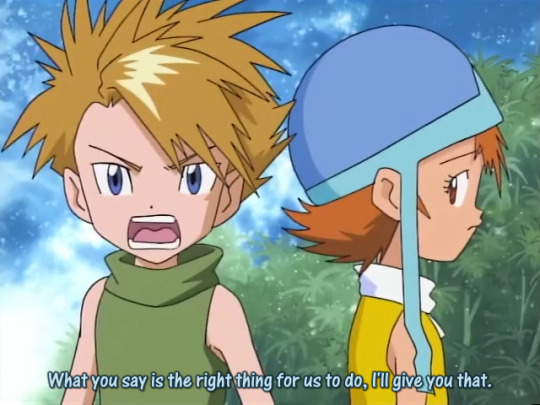

The issue of “whether fighting in itself is the right thing to do” is brought back in the Dark Masters arc, and this is also where we start getting a discussion about the disparity between “the right thing to do” and “whether one is capable of doing said right thing to do”. Mimi, the most emotionally sensitive of the group, starts having an emotional breakdown over whether they should keep fighting and potentially drag in more casualties -- especially because the Digimon that had died had all done it for their sake in order to continue the fight, and therefore the Chosen Children are indirectly responsible for their deaths. Yamato thus explains the difficulty of the situation: he himself agrees that Taichi’s evaluation of the need to push forward and continue the fight is the right thing to do, but it’s inhumane to not consider the stress and and emotional toll this is causing and force everyone to continue in spite of that.
In addition, Taichi’s reasoning for why they should continue is “revenge” -- a very negative, spiteful reason very tied to “fighting for the sake of it”. It’s understandable for Taichi to have these feelings, but he’s going at it from the wrong direction, and he’s overall being very insensitive in this scene. Later, in Adventure episode 45, he says that he’s doing it for the sake of honoring the Digimon who died for them. In other words, a lot of the reason Taichi’s methodology isn’t working is that he’s hung up on “the principle of things”, and not the more pragmatic reasons one should fight.
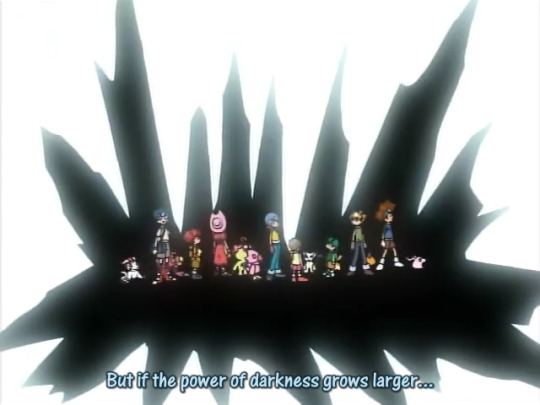
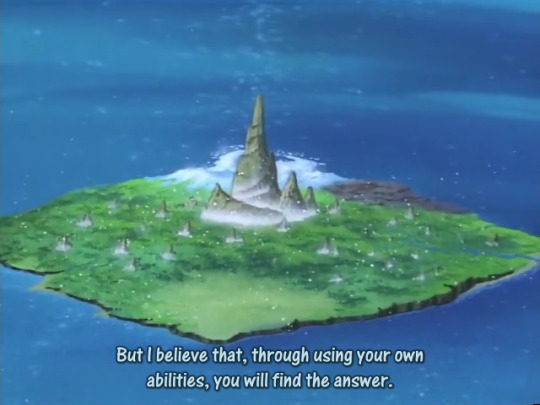
In Adventure episode 45, the kids finally meet the entity who chose them in the first place, who self-identifies as “the one who wishes for stability” -- the novels name them “Homeostasis”. Note the name -- it refers to the maintenance of internal balance within a living system, and Homeostasis themself starts their long infodump with their motive: it’s not that they want to eliminate all darkness from the world entirely, but that the powers of evil are upsetting the balance so badly that everything will be consumed if something isn’t done. It’s not like they’re insistent on violence either -- it’s just that they have a world to protect. The novels give us a particular amount of extra information on this entity, namely that it is not an omnipotent god by any shake of the imagination (in fact, there’s even an implication that there are higher powers that they themself don’t understand), and rather just a mere security system that observed that things were going south and used its rather limited methods of communication (via the Agents) to help make preparations.
Regardless, back to the episode -- we learn that the reason this entity recruited human children into all of this was because of the Hikarigaoka incident in 1995, which displayed to them and the Agents that a bond between children and Digimon could allow Digimon to evolve spontaneously, something that’s not possible with Digimon in the Digital World alone. Oh, and also, that they’ve been wanting to talk to them since File Island, and this entire thing about being cryptic with information was because they literally had no body and there was a massive amount of information loss after the Dark Masters blew up the Agents’ base and killed everyone except Gennai. In other words, just like with all of the actions the Chosen Children had been taking up until this point, everything Homeostasis and the Agents did was out of desperation because they were running out of other options to save their world, and during their brief time of being able to speak with the children, Homeostasis dumps pretty much everything they need to know and speaks to them using the extremely deferential sonkeigo form, meaning that they consider everything the kids are doing to be a massive favor to them. (Contrary to common belief, their possession of Hikari’s body does not seem to be non-consensual, given that they spend multiple episodes trying to contact her, and are clearly depicted having a proper conversation with her before temporarily borrowing her body.)
Most importantly, at the end of their speech, Taichi asks them what to do next, and the response is effectively: “We don’t know, but we trust you to make the best decision.” So, again: fighting as a Chosen Child is not an obligation, but something done because they want to do it and can. They were handed the tools to get this done by Homeostasis and the Agents, who believed in their potential to create miracles and be virtuous people and do something to save their world beyond what the native Digimon could do alone out of desperation and a lack of other options, and they are not hovering over the Chosen Children to see if they’ve “succeeded” or “failed” (note that they seem to have no sense of grudge or disappointment over Taichi’s SkullGreymon stunt in Adventure episode 16, explaining it very neutrally as an example of a risk), but more “we believe you were the best people who were able to do it and we trust your ability to help us.” (This is especially because, while it’s made clear they’d been wanting to contact them for a while, their most direct intervention comes right after Yamato had questioned why they were chosen in the first place -- presumably, they felt that the kids deserved an answer.)

At the end of Adventure episode 45, Mimi, considering the fighting they’re doing to be responsible for all of the fallouts and the sacrifices, decides that she won’t participate anymore, and Jou decides to stay with her in order to convince her to come back (although the novel also reveals that he himself is having doubts, too). Very importantly: nobody begrudges Mimi for being emotionally overwhelmed and sitting out, and nobody even begrudges Jou for choosing to stay with her. This is smack in the middle of the Dark Masters arc when everyone needs all the support they can get -- but after everything that had just happened, it’s inhumane to force either of them forward in this condition.
Despite his doubts, however,��Jou himself is already coming to understand the limits of “pacifism” at a time like this:
What he wanted to tell her was this: that he didn’t see any likelihood of co-existing with the Dark Masters, and that they had no other choice but to fight them.
Even a neutral country like Switzerland had a military. They would be invaded by enemy countries without one. It would be nice and ideal if they used the nonviolent resistance approach as Ghandi did. But that didn’t mean it was okay to just be killed without lifting a finger…
But not even he could find a good answer.
Again: Adventure and 02 are an idealistic series, but they are not naive. It would be nice if the fighting could all stop and everyone would be happy, but there are malicious bad actors who will take advantage of you sitting there and doing nothing.

And so, Leomon dies in Adventure episode 47, and Mimi and Jou learn the hard way: if they do nothing, people will still die. Mimi had witnessed all of the Digimon sacrificing themselves for the Chosen Children’s sake, and thus had followed the logic that their friends would stop dying for them if they stopped fighting, but now that they’ve stopped fighting, said malicious forces (in this case, MetalEtemon) went ahead and killed their friends anyway -- and they’ve gone and destroyed the Village of Beginnings to boot, preventing any of them from being reborn. So in other words, if the intent is to “prevent casualties”, as it turns out, inaction didn’t actually prevent casualties.

Nevertheless, Mimi does not like fighting. In fact, Jou doesn’t like fighting either. Both of them now understand that it’s the best thing to do in this situation, but is it really the best thing to do to force them into embracing violence because of this? Instead, Jou determines in Adventure episode 50 that the overall fight doesn’t necessarily mean that everyone has to jump in and get violent -- the likeable and friendly Mimi has started to cultivate a skill in getting other people to rally behind her, and Jou is starting to consider that he may have a future in treating the wounded and supporting people before they become casualties. Those are still valuable ways they can contribute without forcing them into doing things they can’t bring themselves to do -- and, indeed, Mimi’s rallied army ends up saving everyone’s rears in Adventure episode 52.


While Taichi is not there to personally witness this discussion, Adventure episode 50 has him make a slightly less reckless tactical plan, and he explains (directly citing what happened with Yamato, Mimi, and Jou as his rationale) that he’s learned that he needs to take into account the potential for there being collateral damage. Recall that, earlier, his motive for doing things had been on a sheer principle level, with a lot of negative emotions of spite and revenge. But now, he’s come to understand that the most important thing he needs to do is to “prevent sacrifices”, and that’s the reason they still need to fight. Hence, why Taichi makes a proper plan for doing it instead of just doing the first and most aggressive thing that comes to mind, since he’s a soccer captain and has the potential for being a bird’s eye tactician, after all -- this time, he just needs to channel it in a way that prioritizes the lives of people around them.
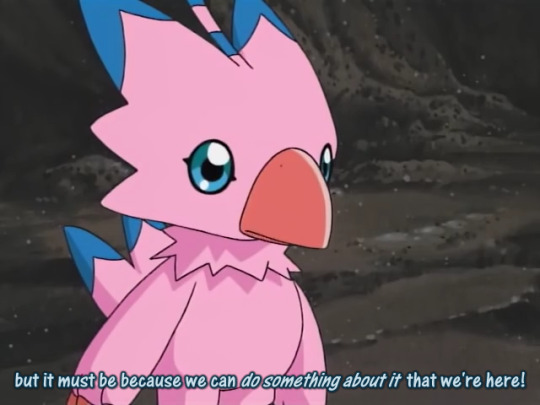
And in Adventure episode 51, when reaching out to Sora (who’s cracking under all of her self-imposed expectations and sense of duty to others), Yamato and Jou take what they learned from Homeostasis six episodes prior and apply it -- Sora is working under the mentality that they have an “obligation” to get this done and that they are impending “failures” if they don’t (and, to be fair, if they don’t make it, the world is going to end, which is pretty unambiguously terrible). But what Yamato and Jou do is reframe it to fall more closely under the philosophy of what Adventure is saying here -- the fact they can do something about it is already absolutely incredible. (I mean, not to sugarcoat the fact that the world is still going to end if they pull it off, but the stress, self-hatred, and self-blame of “we’re failures for not pulling it off” is definitely not going to help.) They are doing everything they can right now, within their reasonable abilities. If they end up not being able to do it, that’s not something that should be considered a sin or a failure on their part; they are here because they can and want to and are doing it and are here to make the best possible use of that.
It’s one of the many times Adventure and 02 will make this statement, indirectly or directly: despite the title of “Chosen Child”, the Chosen Children do everything they do because of their own choices, and because they want to, not because they have to.

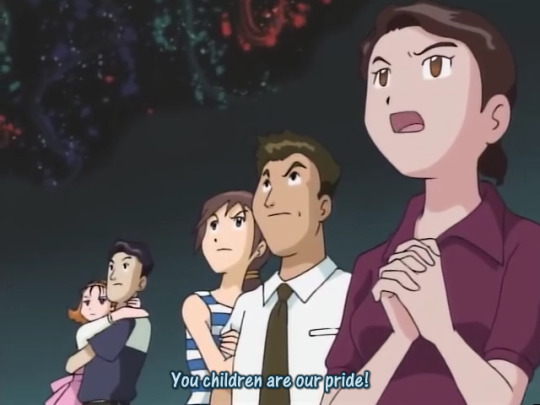
We finally meet Apocalymon in Adventure episode 53, and we learn that he(?)’s a combined spirit made up of all of the Digimon that were “eliminated” and failed during the evolution process, and is deciding to take out its anger and spite at the world out on everyone else by “denying evolution” (this is clarified in the novel to also be the reason it subtly influenced the prior enemies to destroy everything and especially the Village of Beginnings, because it functionally would put an end to the Digital World’s evolution by reducing it to nothing). So, in the end, we have a contrast between Apocalymon, who’s fighting for the sake of self-centered spite (including wanting to take down everything with it in Adventure episode 54 even when its demise is already clear), and the Chosen Children, who are fighting to protect their loved ones.

Incidentally, we also learn in Adventure episode 53 that there were Chosen Children who put an incomplete seal on Apocalymon prior to the ones in 1999. (Kizuna also introduces Menoa Bellucci, who became a Chosen Child in 1997, and assuming you’re following Adventure’s background doubling-every-year lore, at the time of 1999, there were a whole eight other Chosen Children besides Taichi’s group in existence.) The novels make it clear that the time dilation and distortion was going all the way up until the defeat of Apocalymon, long enough that the partners of those older Chosen were able to evolve to the Holy Beasts (and possibly enough for said older Chosen to get really faded through Digital World history to the point even Gennai doesn’t know about them). So the point here is that in the grand scope of the entirety of Digital World history, Taichi and his friends are not particularly singular existences -- there are people who saved the world before them, and 02 will introduce people all over the world who are going on their own adventures (including the main 02 kids in Tokyo), and, of course, by the time of the 02 epilogue, everyone’s going to have a Digimon partner. Koushirou later observes in Two-and-a-Half Break that there’s nothing special about having a partner in itself.
Does that make Taichi and his friends’ adventure of self-growth and saving a whole two worlds somehow insignificant, just because it’s not particularly unique? No. Because, again, they did this all not because of whether Homeostasis chose them or not, but because all of it was operated by their own will and strength and desire to protect others, all within the restraints of what they could feasibly do and handle, and they are amazing people for pulling that off.
02 and the importance of mutual understanding (and, also, more about the morality of fighting)

Before we proceed onto the 02 analysis, I think it’s important to establish a bit of important context about how 02′s lead protagonist, Daisuke, approaches things, and how it relates to the recurring debates on the morality of fighting throughout the series. In 02 episode 14, we learn that Daisuke was captured at Big Sight during the Odaiba Fog incident, and therefore witnessed, firsthand, the threat of Vamdemon’s lackeys attacking innocent civilians (something that Miyako, who witnessed the self-contained Omegamon vs. Diablomon battle on the Internet, and Iori, who only happened to be on a grounded plane after the Vamdemon fight had already ended, did not quite have anything on the par of). Spring 2003 and the Adventure novels elucidate what was going on in his head at the time: he was frustrated at his inability to protect his loved ones, and wished to have the power to fight the “bad guys” who were threatening everyone.
Remember this for later.
Moving onto 02 itself. 02 is a series about relationships, but, more significantly, it’s a series about the sheer amount of work it takes to maintain relationships, and especially the principle that “maintaining a relationship to another person requires being properly aware and understanding of the other person’s feelings.” One thing that often frustrates me about a lot of media (both kids’ shows and non-kids’ shows) and, well, to be honest, a lot of people in general, is the preaching of supposedly “positive” platitudes that actually go straight into what’s called “toxic positivity” for good reason -- because while it’s ostensibly “positive”, it also denies other people’s feelings, waving away everything negative and going “yeah, well, positivity!” and “optimism!” and “power of friendship!” and all sorts of stuff that are actually dismissive because they’re not showing any real effort to properly understand the other party and acknowledge why they feel this way. Like, sure, you may be telling someone to cheer up, but it also carries an (accidental or otherwise) implication of “you’re irrational and stupid for being upset and you should be smiling all of the time because ~positivity~.”
There is a lot of conflict in 02 -- especially because the theme of the morality of fighting is even more relevant, particularly in the case of the added question of “when the enemy in question is not an unambiguously evil sadist but a former friend in trouble”, and later the question of how someone who’s done horrible things in the past but is clearly making an active effort to make up for it should be treated. Daisuke, 02′s lead protagonist and carrier of a lot of its main themes, is ostensibly a simple-minded idealist, but even his theory of “positivity” and “always moving forward” has a lot of nuance beyond what you would usually see in this kind of anime lingo.



Context is also very important here. Adventure and 02′s stance being about “doing the best you reasonably can in a given situation”, it also means that what might be the best thing to do will change depending on context. 02′s starting circumstances are very different from Adventure’s, because it starts off without the threat necessarily being immediately world-threatening -- certainly, they need to stop the Kaiser, but this is in the form of a long-term territory war with an enemy who (at the time) doesn’t appear at night, and it’s unclear just how long it’ll take. This means that when the threat is not immediately world-ending, none of the kids are ever given grief for prioritizing their own personal obligations in lieu of fighting.
Iori and Jou do choose to ditch their kendo lesson and prep school exam (respectively), but they make it clear that they did this out of personal choice, and in fact this conversation opens with Armadimon apologizing to Iori for giving him grief for not coming, because he thinks Iori is perfectly within his rights to have stuck with the lesson! Perhaps, if the world were to end in a few hours, it would certainly be pretty idiotic to insist on sticking with a kendo lesson or prep school, because those things aren’t going to exist anymore if the world ends, but this is a very long and drawn-out territory war with no known end, and it’s understandable that these kids need to maintain their life necessities while straddling the balance between the war and their lives as a whole.
Again, they’re doing the best they can, and being a Chosen Child is about doing things because they want to, not because they have to.

This is especially because the Kaiser himself attempts to exploit the meaning of a Chosen Child in 02 episode 3 -- again, being a “Chosen Child” means being trusted to do the right thing with what you’re given, but the Kaiser basically betrayed that trust, and nobody was able to stop him from exploiting it and attempting a takeover with it. And Ken takes that title of “Chosen Child” and interprets it to mean he’s entitled to all of this -- but the other kids are Chosen Children just like him, and (at this point) all of them are simply choosing to do whatever they want with that.


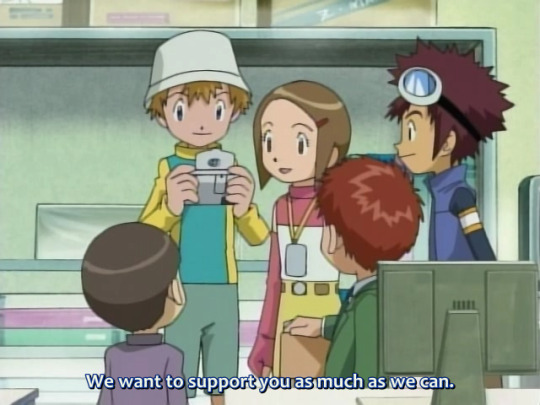
And on the flip side, you have the Adventure seniors, who are a little nerfed by the Dark Towers, but as far as the way the younger 02 kids see them goes, there is no doubt that the 02 kids respect them deeply and are practically reliant on their support and advice, and their experience and maturity in comparison to themselves. The episode that establishes most how in awe the 02 kids are of their seniors is 02 episode 17, where they learn the details of the adventure in 1999, and so it’s not about how much combat power they’re displaying right now but rather how much experience they have in doing such amazing things. Likewise, their seniors are frustrated at their inability to help -- not because they see it as some obligated duty, but because they see their juniors trying their best to deal with an ongoing crisis and want to help, resulting in them providing support roles such as covering for them with a camp trip in 02 episode 18 and allowing them to do a long-term Digital World stakeout. For this, the younger 02 kids adore them and give them all of their respect.
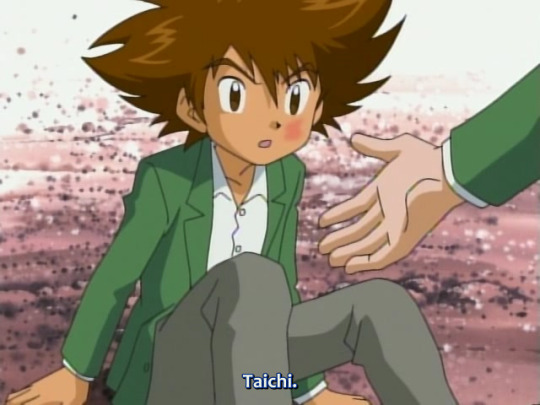

02 episodes 10-11 are significant in juxtaposing the themes of “conflict” and “understanding each other’s feelings” -- at the end of 02 episode 10, we see Yamato punch Taichi, but he holds his hand to him right after, indicating that Yamato punched him not out of anger or condescension or scorn over Taichi’s hesitation to fight Agumon, but rather simply to snap him out of it for his own sake, knowing he wouldn’t take it offensively, so in other words, what looked like a “conflict” on its face was actually communication between the two, with neither of them treating each other with scorn.
The conflict at the end of the episode is over whether they should run the risk of killing Agumon in the process of fighting him to get him back from the Kaiser’s Evil Spiral-induced brainwashing (note that this is about the risk, since it’s not necessarily guaranteed they’ll have to kill him, and they still of course need to make a conscientious effort to prevent that outcome). Yamato, however, frames it in terms of very practical matters, and even takes Agumon’s own feelings into it while he’s at it: if they pull back purely for the sake of not running that risk, Agumon will end up being the Kaiser’s slave and killing machine and nothing will be resolved, whereas if they run the risk, the best outcome is that Agumon is saved (which is, fortunately, what happens!), and the worst outcome is that he’s killed, which is still a preferable outcome to him having to remain the Kaiser’s brainwashed slave used to kill other things en masse.
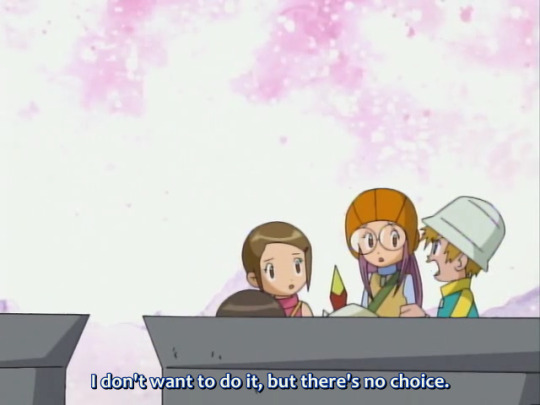
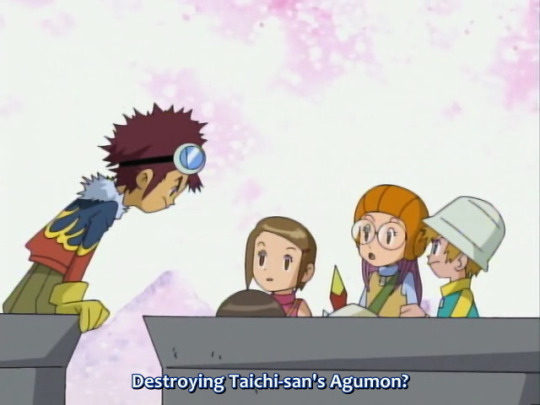

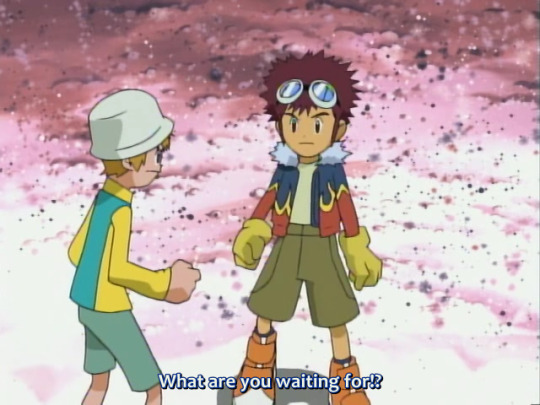
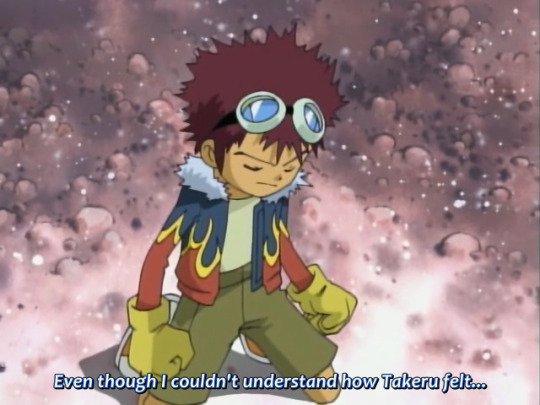
02 episode 11 further explores the theme of conflict in the face of “understanding each other’s feelings”, as it starts off with a fight between Daisuke and Takeru on the grounds of whether it’s okay to risk killing Agumon. Takeru’s stance is to side with Taichi’s decision, even if he doesn’t like it (again: just because some of these kids are able to make these decisions doesn’t mean they like it, and they’re doing it not because they’re callous but because they’ve thought hard about it and have decided it’s the best option they have!). Daisuke, being a bleeding heart, is appalled that Takeru could so easily endorse killing Taichi’s partner, and the two fight.
Note that the series does not “both-sides” this issue -- Taichi and Takeru’s stance is basically treated as the optimal course of action here -- but it also doesn’t invalidate Daisuke’s feelings of understandably being very shocked and appalled by this! Taichi and Yamato, in what initially seems like a violation of common sense, encourage them to be allowed to continue fighting, saying that it was essential to their friendship, and that confuses everyone present at the time -- but the meaning becomes clear by the end of the episode, when Takeru’s own Patamon is momentarily taken by the Kaiser and put at risk of himself becoming an Evil Spiral slave. Takeru blows up at Daisuke for hesitating (remember, this is one of his triggers), and eventually runs the exact same risk he’d advocated for Agumon with his own partner.
Remember what I said about “toxic positivity”? If everyone had just forced Takeru and Daisuke to shut up for the sake of “not fighting”, both of them might have remained angry at each other and stewing in silence, but because of the conflict, Daisuke himself personally witnessed Takeru run that risk for his own partner, presumably for the same reason (as much as the potential of Patamon being killed hurts him, the idea of Patamon being used as a killing machine is even more panic-inducing for him). With that, he understands that Taichi and Takeru made the decision to go ahead with this not out of callousness or cruelty, but because they sincerely felt they had to, no matter how much it pained them. Daisuke rails on himself for not understanding Takeru’s feelings better, and considering that he and Takeru never get in this vicious of a fight again, the point is: it wasn’t about whether they should form a friendship by fighting or not fighting in itself, it was about the fact that the two of them were able to get their feelings on the table, and that Daisuke was able to understand why Takeru endorsed what he did. (And this, too, is what it means for why Taichi and Yamato are friends now because they fought so much in the past -- back in Adventure, those fights ended up having them bare some very raw feelings to each other.)

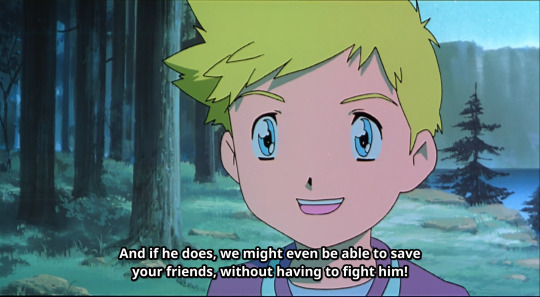
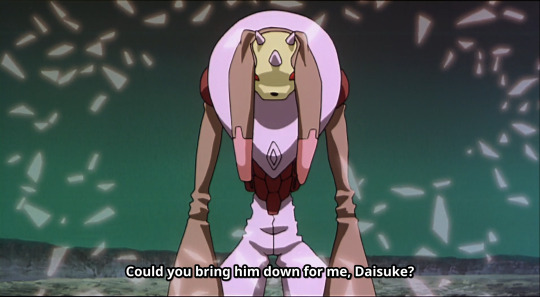

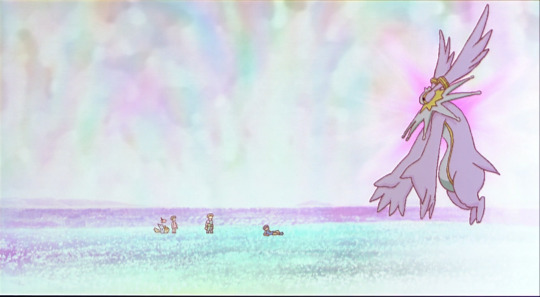
While in the series itself, they’re successfully able to save Agumon anyway, Hurricane Touchdown presents a more unfortunate outcome of the “friendly fire” debate, in which Daisuke learns that the hostile Digimon kidnapping their seniors (and, later, a lot of other people) is Wallace’s own partner. Daisuke is so emotionally overwhelmed by this that he breaks down crying at the possibility of having to kill someone’s partner, knowing that he’d never be able to do something like this if it were V-mon, and Wallace gets him on board with an attempt to appeal to Chocomon without fighting.
This stance is not unreasonable, Wallace and Daisuke cannot be blamed for being hopeful, and, in the end, it’s admirable that they did make a conscientious effort to solve this with pacifism (again, this kind of attempt should be made, and it’s not good to beeline to the most violent solution for no reason). But unfortunately, once they meet Chocomon in the flower field, it turns out that not only is Chocomon beyond reason, he himself is also clearly out of his right mind and suffering through all of this, and Wallace finally relents and asks Daisuke to assist him in the fight (after having stayed in denial for half a movie about wanting to avoid this). Daisuke, witnessing all of this himself, agrees without hesitation, and eventually, it turns out that this decision for the best when Chocomon himself begs Gumimon and Magnamon to put him out of his misery, and them obliging (albeit hesitantly) allows him to have peace in death instead of suffering in life.
Hurricane Touchdown’s sequel drama CD, The Door to Summer, presents Daisuke with yet another dilemma with Nat-chan, who is also clearly suffering in quite a similar vein (the parallel is directly drawn). In the end, the same conclusion is reached -- Nat-chan is unfortunately killed, but is able to find release.
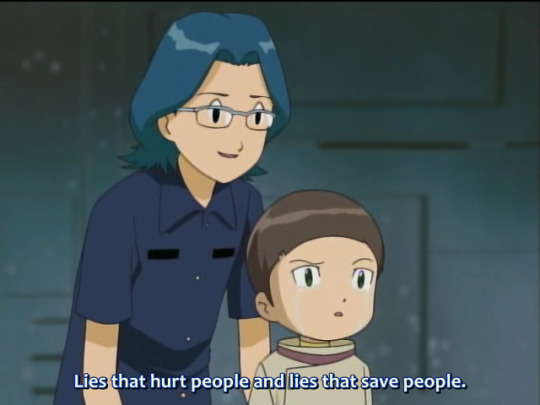
02 episode 16 presents an argument about the limits of ethical principles instead of approaching things practically, when Iori considers himself a horrible person for having told a lie to get Jou out of an important exam. This is mainly just about a lie, but in terms of Iori’s character arc and its relevance to 02′s themes as a whole, the point here is that there is a certain point where being too stuck on “the moral principle” of things instead of thinking practically is actually selfish in some sense. If Iori hadn’t lied, he’d get maybe one more point of moral integrity, and then everyone would have suffocated to death -- compared to lying and therefore everyone for the most part benefiting (Jou’s very happy to help his juniors and save them from, well, literally suffocating, after all). This topic becomes very important later when it turns out to be generally applicable to the wider morality of fighting that the kids later face in the series’s final cour.

The disparity between “moral principles” and “what actually happens in practice” also shows up in 02 episode 19, when Takeru loses his composure and starts punching out the Kaiser. Is the Kaiser a horrible person (at this point) who totally deserves this? Absolutely! Are we as the audience getting a lot of catharsis seeing his face punched out? Probably! But at the same time, railing at the Kaiser with unbridled anger is also...not actually accomplishing anything! Instead, Takeru’s just getting a few moments to stew in some really unhealthy emotions and uselessly punching out the Kaiser while nothing productive is getting done, and it’s also contributing heavily to his emotional isolation from Iori (and the rest of the group) because he’s not coping with it in a healthy way at all. Takeru’s feelings are certainly understandable (again: the episode is absolutely framing this in such a way that you’re inclined to take his side), but at the same time, being malicious about this is not actually practically making any headway.
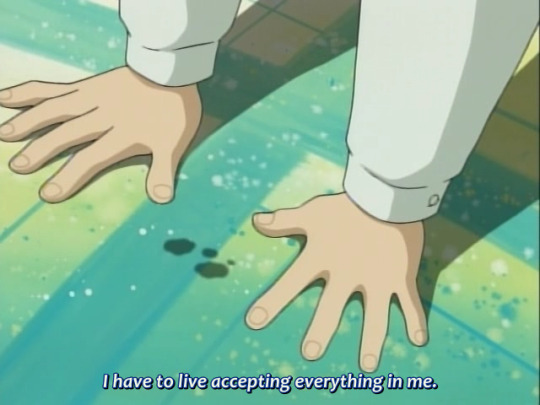
One of the major reasons I’m covering all of these seemingly unrelated topics in one post is that all of them end up having a massive combined amount of relevance to the narrative behind Ken discarding the Kaiser persona, and how he comes to integrate himself with the group. On the surface, the storyline seems to be simply that Ken learned the error of his ways and tried to stop drowning in regrets, and Daisuke’s idealistic personality reached out to him and helped him heal. That said, there’s quite a bit more going on than just that.
A theme going on behind Ken’s character arc for the second half of 02 is one that probably seems a bit unusual for an idealistic kids’ show, but the point that ends up being made quite often is that whether Ken should be “forgiven” for his actions is a rather immaterial question. 02 episode 23 has a bunch of Baby Digimon rail on him, and remind him that he will never be able to take that back. There is nothing in either world that will erase those actions or make them retroactively justified or pushed under the bridge. The only thing he can do is accept the fact that it happened, whether he likes it or not, and determine what to do from here in terms of taking responsibility and making things right.
And this ends up having an influence in how Daisuke advocates for him, and how the rest of the group reaches out to him...
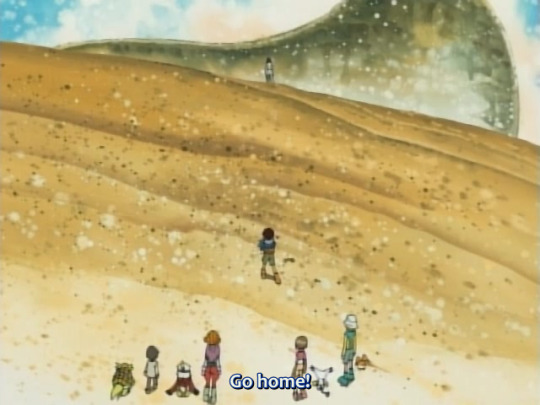
First of all, Daisuke being the most open-minded about Ken was not blind optimism. There’s no evidence that he was actually all that emotionally receptive to Ken or interested in being his friend before 02 episode 25. However, Daisuke also does not advocate for “punishing” Ken or kicking him while he’s down -- because that won’t accomplish anything, and Ken is clearly not in a state to be wreaking more havoc right now. Daisuke remembers the footage of Ken’s parents crying on screen, and determines what would be the first course of action to fix this situation -- and thus, he tells Ken to “go home”, because whatever Ken did in the past and no matter how much the team resents him right now, they are in this situation, with a boy who’s clearly not going to cause any more trouble right now and a family that’s hurting by his absence, and the very least he can do is do something productive from here on out.
Hence, at the end of 02 episode 24, when it turns out that Ken’s back and saved them from Thunderballmon, Daisuke decides to be optimistic about him and start the process of emotionally reaching out, but, again, it’s not blind optimism -- he sees what Ken did and takes this to mean “okay, clearly he’s not going to do bad things anymore, so regardless of whatever he did in the past, he’s helping out now, so we should check in with how he’s doing and let him help out.”
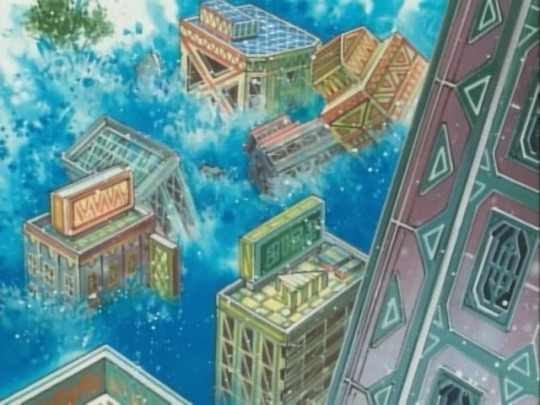

This is, of course, enhanced by the fact that Daisuke had communicated with the Crest of Kindness in 02 episode 20, but there’s also another layer to this: the major point of dispute between him and Miyako in 02 episode 25 (with both of them generally being rather open-minded about Ken otherwise) is in regards to the fact Ken and Stingmon were responsible for killing Thunderballmon in the prior episode. Come the climax of 02 episode 25, it is made clear that if Golemon successfully destroys the dam, the results will be absolutely disastrous, and there will probably be an incredible amount of casualties. Here, Daisuke himself is the first person to realize that killing Golemon may become a requirement (Ken is not actually a part of his initial comment) -- that is to say, most likely, the reason he’s willing to give Ken the benefit of the doubt about Thunderballmon is that he himself is understanding of that potential mindset (especially since 02 episode 43 does indeed establish Daisuke as being the first to accept it).
Recall that, between Daisuke, Miyako, and Iori, Daisuke was personally involved three years prior in a large incident with an unambiguously malicious Digimon that was about to claim a ton of victims -- he’s a bleeding heart, sure, but he’s also a bleeding heart for the potential victims, and the one thing that ate at him during the time of the Vamdemon incident was that he couldn’t do anything to protect everyone. Therefore, he’s the most receptive to this potential conclusion because he doesn’t want to see victims like that again. Not only that, Takeru and Hikari (having witnessed similar conclusions back in Adventure) are also very quick to point out that this might be an inevitability -- it’s just Miyako (who, in her emotional passion, is desperate to find a way out and clinging onto the hope that they won’t have to) and Iori (who considers doing such an act “no better than him” -- again, see the fixation on “moral principle” and “being above him”) who are so vehemently against it.
In the end, it turns out that Golemon is a Dark Tower Digimon (and therefore not sentient), and everyone’s left off the hook for now, but the reason this is still important is that through this, Miyako learns that Ken -- someone whom everyone was side-eyeing for potentially lapsing back into his cold, callous ways after supposedly having given up the Kaiser mantle -- was not out to kill (and, indeed, when the first kill inevitably happens in 02 episode 43, Ken is just as shaken about it as Miyako and Iori). The important part is that Miyako, and later the other kids, accepted Ken not out of some principle of optimism or forgiveness, but because they came to understand his position and feelings. All of the kids accepted Ken on their own terms after understanding his feelings and position better via interacting with him and hearing his own testimony -- they came to understand his mindset, what he’s been through and what he’s planning to do from here on out, and, most importantly, that he needs support really, really badly right now.
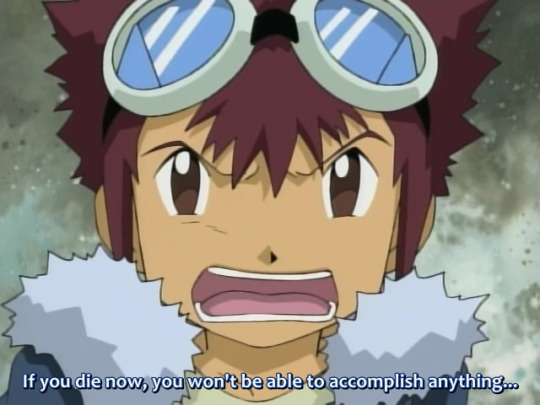

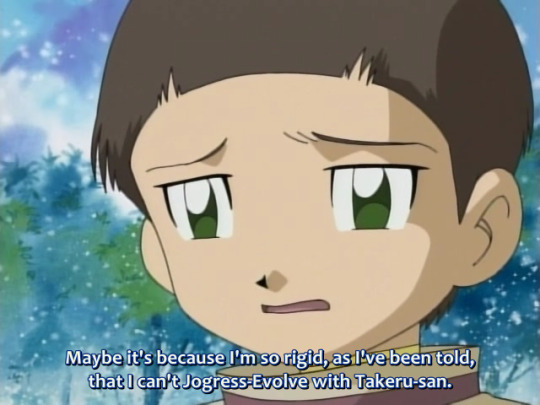
Which extends not just to Ken, but also everyone’s relationships here in general. Daisuke broke through to Ken and kicked off their first Jogress in 02 episode 26 because he proactively listened to everything Ken was saying and what he wanted to do, and correctly identified that Ken very desperately wants to take responsibility, so he talks him out of a reckless suicide mission by pointing out that all of his attempts to not make his family sad and to make up for everything he’s done are going to amount to nothing if he just throws his life away like this. In 02 episode 31, Miyako listens to Hikari’s troubles and her compulsion to not speak out for herself and reaches out to her successfully via promising to be there for her so she doesn’t have to slink into passive resignation. And in 02 episodes 34-36, Iori makes an active effort to understand Takeru’s mentality and why he has the drastic personality shifts he does, and communicates to Takeru that he wants to understand him better. So the point is: the 02 kids were able to successfully connect with each other and become deeper friends because they made an active attempt to listen to each other’s troubles and address the core of what they needed. They were only able to become “supportive” once they understood everything.
(02 episode 36 also has a moment where Iori’s about to rail off at everyone for not taking the fight seriously, before Armadimon reminds him that he’s starving -- again, it is very inhumane to ignore other needs and force everyone to keep fighting endlessly just because they theoretically can.)

We do meet the representative who claims credit for choosing Daisuke, Miyako, and Iori as Chosen Children in 02 episode 37 (Qinglongmon, representative of the Holy Beasts), and he explains the process of why they sent the kids what they did in order to retrieve Ken from the deep end. Notably, Qinglongmon admits that even the Holy Beasts were blindsided by a few things and adapted the situation as they saw fit (they didn’t originally expect the kids to be able to use multiple Digimentals at first). More importantly, this was, again, all a bit of a desperation move, because this was about as much as the Holy Beasts could manage, being sealed and drained of power and all.
Also, while retrieving Ken from the deep end was on the list of things the Holy Beasts set out to do, “everyone becoming Ken’s friend” was not necessarily on that agenda. Again: that was something that these kids chose to do on their own, by observing Ken’s actions and feelings and choosing to connect with him.
The episode ends with BlackWarGreymon going off on a journey of angst, and: note that the kids decide to drop the issue for the time being. Again, they’re operating not on a philosophy of grudge or whether one should get retribution for their actions, but what the likelihood of bad things continuing to happen is from here on out, and at this point in time, it doesn’t seem very likely, so there’s no point in pushing the issue or pursuing him.


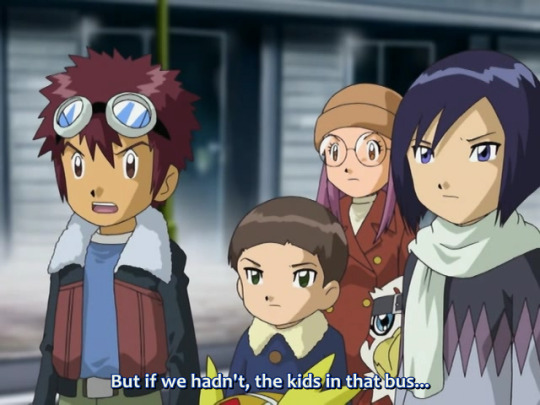
Nevertheless, the morality debate over killing still remains looming over everyone’s heads, with Iori also realizing in 02 episode 29 that there are such things as Digimon that just want wanton destruction and cannot be negotiated with. The fact that the Adventure kids were put in world-threatening situations three years prior and are already far past this question is directly acknowledged in 02 episode 43, with Taichi advising Hikari that this harsh truth is going to hit the other four sooner or later, before it does eventually happen at the end of the episode. (Hikari visibly winces during her conversation with Taichi; again, none of the Adventure kids ever liked this.) And, in the end, predictably, Iori, Miyako, and Ken take it hard -- but Daisuke is the first to point out what would have happened if they didn’t do it. Namely, that the victims would have far outnumbered the Digimon they just killed.
It is, of course, good to be conscientious and not beeline for the most violent solution, and, again, context is important here -- in the situation provided, SkullSatamon was holding up a bus and split seconds away from murdering everyone in it. Had everyone refrained for the sake of morality, just like how Iori refraining from lying back in 02 episode 16 would have actually been selfish in a sense, here, the only claim you get to say after refraining is “well, I wasn’t the one who caused the harm.” Inaction would have caused the deaths of all of the young children in the bus; there would have been casualties either way.
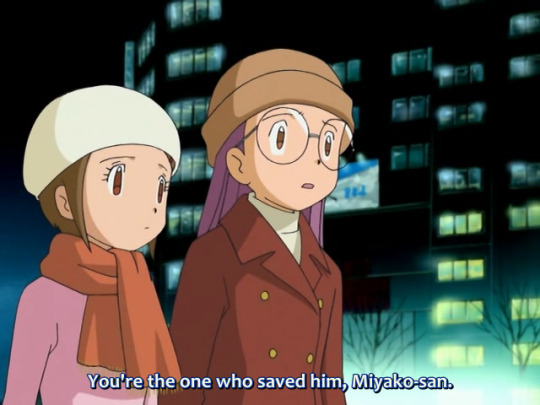

Miyako and Iori are forced to face this truth again in 02 episode 44, with both of them being emotionally compromised by the reality of what they just did. In both cases, Hikari and Takeru step in to remind them what they’re doing this for, by pointing out the victims that would have been killed had they done nothing. Miyako and Iori are not at fault for being emotionally compromised or doing their best to prevent it -- it’s just that there’s only so much they can blame themselves for when they’re now directly faced with the potential victims in front of them.
Iori had already been grappling with this potential for several episodes now, so while he still takes it hard, more attention is given to Miyako’s reaction -- especially since she herself was the victim who was about to be murdered by LadyDevimon had Silphymon not done the kill. The voice acting and lack of Tailmon’s presence in Silphymon’s apology to Miyako implies very heavily that it was the Aquilamon side who took over and did it in a last-ditch effort to save Miyako’s life -- and he’s emotionally destroyed by it himself too, because he did it out of love for Miyako, and yet betrayed her request to not go for the kill. In the end, Miyako is forced to confront the fact that this was done out of love and a desire to protect, not a callous and malicious intent to murder, and comes to terms with it.
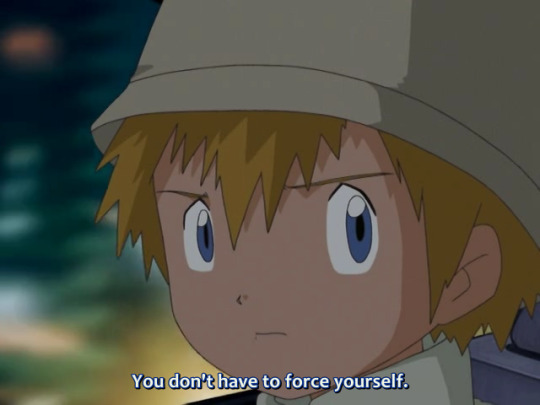
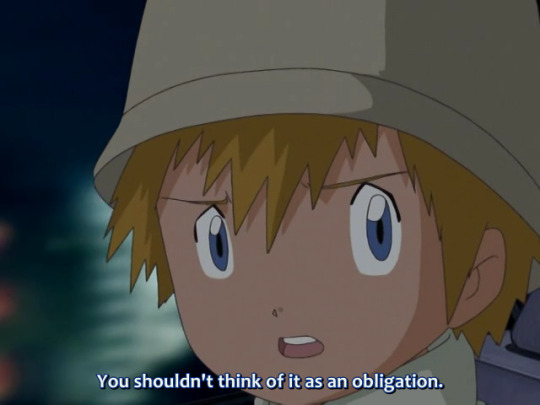

However, again: the series continues to reiterate that people who are not emotionally up for it should not be obligated to force themselves to do it. The beginning of 02 episode 45 has Takeru directly advise Iori that he shouldn’t do this out of obligation if he isn’t up for it -- remember that Takeru will only be able to fight with Shakkoumon if Iori is present, meaning that he’s perfectly willing to give up his ability to fight effectively because it’s not fair to force Iori to do it. This is not a series that advertises that everyone embrace the spirit of killing things and numb themselves to it. This entire situation sucks.
However, Iori makes it clear: he understands everything, and has decided to do it himself, because he understands the stakes and what it’s going to take to actually protect people.
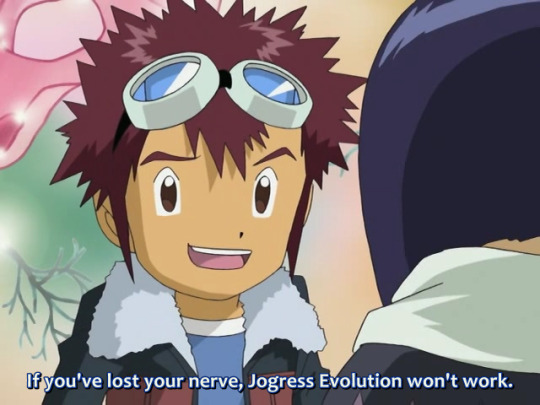
Which is also reiterated in 02 episode 48 -- after witnessing the deaths of Archnemon and Mummymon at the hands of BelialVamdemon, everyone is shaken to the core. It should be established that the kids didn’t have much reason to sympathize with or like the two of them at this point, because everything we learned about them was from the audience’s point of view -- as far as the kids knew them, they were just two really rude and cruel Digimon who wanted wanton destruction. Yet even they are emotionally pained to see them die in such a cruel manner, and it causes everyone to hesitate -- even Daisuke, who does push forward because he knows what’s at stake, but still has to take a moment to collect himself.
Seeing what Daisuke’s about to do, Ken tries to force himself to join Daisuke so that Daisuke will at least not be alone (note that he actually says upfront that he’ll join!) -- but Daisuke notices that Ken’s heart isn’t in it, and actively advises him to sit out. Is the world in immediate crisis? Absolutely! But there is no scorn to be had for people who are emotionally falling apart right now and unable to get themselves to do it -- Daisuke even says himself that they won’t be able to fight effectively with Ken like this.
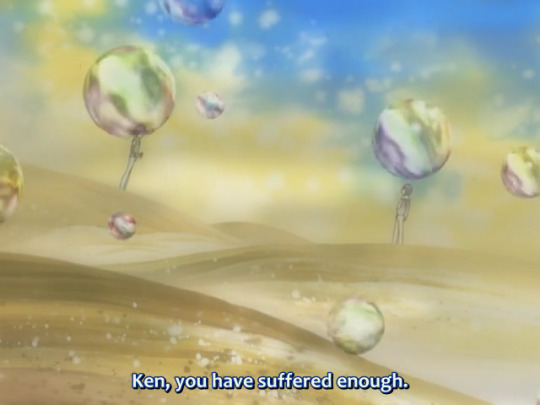

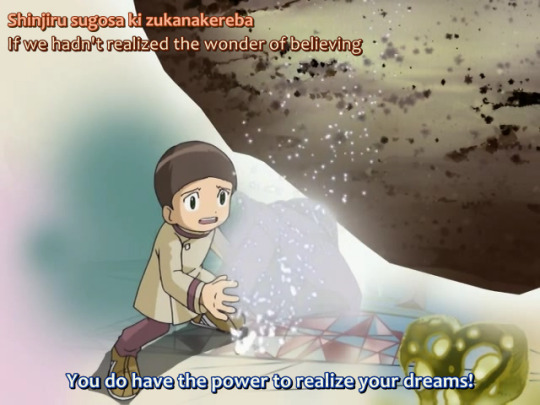
We close this analysis on a return to the concept of forgiveness and moving forward, and we learn in 02 episode 48 that Ken has two parts to his internal wishes: he wants the Kaiser (himself) to be “punished”, and he wants “forgiveness” from his deceased brother Osamu. Both of those things will certainly make him feel a little better emotionally, but they also won’t accomplish anything -- the “Kaiser” doesn’t exist anymore, so what good will that “punishment” do besides a little catharsis for the victims? And he can continue chasing after this standard of “whether he’s suffered enough” like it’s some numerical tally, but that’s not going to get him anywhere either, and it’s why Wormmon has to chase out even that ostensibly happy image of Osamu. Osamu is long gone, and is not going to return, and the question of whether Ken should be “forgiven” is rather immaterial. It’s not about whatever happened or didn’t happen back then; it’s about what Ken is going to do now.
Actually, what is “forgiveness” anyway? At no point do the 02 kids ever actually say they “forgive” Ken for his actions. In Spring 2003, Iori also says he doesn’t forgive Oikawa for what he’s done, either. There’s nothing that will ever erase what they did or suddenly make those actions retroactively justifiable, and there’s no arbitrary payment that Ken or Oikawa could do to meet some kind of quota of forgiveness. But what the kids do recognize in Ken is that, regardless of whatever he did in the past, at current he is a young boy in intense emotional distress who has gone through a lot, is working very hard to make up for his mistakes, and needs all the emotional support he can get, and there’s no reason to hold a grudge against someone like that instead of continuing to support him and loving him for who he is now. Given that, does it matter whether they “forgive” him or not?
And even if Iori will never forgive Oikawa, he can still lament everything that happened to him and drove him to do everything, and appreciate the meaning of what he did for the Digital World in the end, and use this as a further lesson on what it means to understand people instead of stewing angrily in a grudge that’ll only hurt himself.
Ultimately, that is the theory behind Adventure and 02. The world is messy, imperfect, and doesn’t fit under neat rules of morality and “right” or “not right” that you can cram everything under. Despite that, there’s something to be appreciated in not throwing in the towel and continuing to do the best you reasonably can in every situation. It would be ideal if all of the fighting could stop, or if it were possible to make the “optimal” decision of fighting or not fighting in every situation regardless of human exhaustion or emotional compromise, but that’s just not something that’s possible, and there’s no reason to call oneself a “failure” for not holding yourself to that standard. And in the end, the answer is this: instead of fixating on all of those arbitrary things that don’t actually serve any practical purpose, the way to live your best life is simply to look at where you are now, think about what you can do from here on out (regardless of what happened in the past), and do your best to protect and be kind to yourself and those around you.
Of course, you must be kind to others. But you have to be kind to others by understanding what it takes and everything around it -- and then choose to be kind anyway.
115 notes
·
View notes
Text
Libra Compatibility
LIBRA + ARIES (MARCH 21 - APRIL 19) ♥♥♥♥
You're opposite signs who can match up well, but you sometimes baffle one another, too. Aries rules the self and Libra rules relationships. Libra is a lover; Aries is a fighter. Your polar extremes can be a great complement if you borrow what the other does best. Rash, temperamental Aries could stand to give others the benefit of the doubt, to look before leaping—something the wise Judge does well. Languid, overly accommodating Libra can learn to speak up, say no, and take action instead of pondering the possible consequences for a year. Although your differences can be irritating, they also make you a well-rounded couple if you play them right. When Aries needs to rant, patient Libra offers uninterrupted listening, capped with sage, sensible feedback. In return, Aries helps Libra overcome a mortal fear of conflict, teaching this sign how to stand up for his rights. As parents, or even business partners, you play the good cop/bad cop routine like seasoned pros. Just be willing to adjust your internal thermostats as needed. Hotheaded Aries will need to dial down the anger, lest all that concentrated emotion throw Libra's scales off balance. Erudite Libra will need to descend from that lofty, cultured perch and take a bold risk. (No, Aries does NOT consider ten years a reasonable time to wait for an engagement ring—and never will.) Compromise is essential for you to find a rhythm.
LIBRA + TAURUS (APRIL 20 - MAY 20)
Your signs are both ruled by Venus, but your disparate elements prevent this from being an ideal match. Taurus is a fixed Earth sign who builds his castle by the sweat of his brow, then lords over its inhabitants. Libra is cardinal Air, a Queen bee who buzzes around, ruling the hive without doing the drone-work. You both want to be in charge, but your clashing leadership styles create a patchwork parliament that can't agree on anything. Taurus is planted on terra firma, and Libra lives in the clouds. Of course, if the Bull is content to be the provider while Libra dresses up and plays charming host, then this can work. You're certainly an attractive pair of aesthetes, and you share high-end tastes in fashion, décor, food and all the Venusian pleasures. Shameless snobbery is a shared affliction, but neither of you cares to be cured. You love to talk about art, literature, politics, everything under the sun—though Taurus may find Libra's values superficial, and moderate Libra will take offense to the Bull's heavy handed opinions. At least your sexual attraction is strong, and that will take you far enough. However, conflict-avoiding Libra will need to build up some backbone to avoid being steamrolled by dominating Taurus. The Bull will need to turn down the volume, and Libra must get better at addressing issues head on, rather than letting them fester.
LIBRA + GEMINI (MAY 21 - JUNE 20) ♥♥♥♥
You're compatible Air signs with silver tongues and gilded wings, a magical match indeed. Libra is a pretty pixie and Gemini is an impish sprite. Your meeting rouses the fairies and gnomes, stirring up mischief in your midst. You love to mingle and schmooze, and you'll chatter like two little tree monkeys, gabbing a mile a minute. But will the breathless excitement last? Getting past the superficial romance stage is the challenge. You're both so indecisive that nailing down a commitment is like catching moonbeams in a jar. That said, the illusionary quality of your relationship is a magic you both enjoy. It's when life becomes too real that you vanish in a pinch of enchanted dust. To make this last, you'll need to dip your toes into the murky morass of intimacy, then learn to swim. Money can become an issue between you, particularly the way you spend it. Gemini is ruled by intellectual Mercury, and would rather invest in college degrees, a film collection, enriching travel. Libra is governed by beauty and pleasure-loving Venus, and splashes out on art, couture, custom suits, spas. You'll need separate wings for Gemini's books and Libra's handbag or shoe collection. You have different approaches to romance, too. Libra loves a lengthy courtship with all the trimmings, but Gemini bristles at picking up too many tabs, especially with Libra's extravagant taste. You'll probably need to keep separate accounts to avoid meddling in each other's purchase habits. Cut up the credit cards, too—many happy relationships can be destroyed by debt. Don't let that happen to you.
LIBRA + CANCER (JUNE 21 - JULY 22)
You're a sweet, romantic couple, but not always a perfect match. On the upside, Cancer is ruled by the caring Moon and Libra by romantic Venus, casting a tender glow on this love affair. With your flair for color, style and objets d'art, you could open an interior design business (your home may in fact resemble an Architectural Digest spread). Now, the challenge: Cancer is a deeply emotional Water sign whose moods fluctuate like the tides. Libra is a social Air sign who prefers to happy-dance through the daisies. Between the Crab's fatalism and Libra's denial, nobody has a strong grip on reality. Better keep a few grounded Earth sign friends on speed dial when you lose perspective. Failing that, you'll need to adapt to each other's opposing natures. Like a stone skipping across the water's surface, Libra averts the plunging depths of Cancer's inconsolable undertows and cloying neediness. Yet, avoidance is futile, since it only upsets the Crab to be ignored. Libra should learn that a hug, flowers and an apology (however undeserved) pave the quickest path to peace. Not that Libra doesn't have his own powerful undercurrent: when those scales tips out of balance, he can escalate a minor breakdown into a Code Orange catastrophe. Admit it: you're both big babies at times. For long-term success, find activities you both enjoy: travel, language classes, dancing, dinner parties. You're gracious hosts and culturally literate people with lots to talk about. Get out and savor life together.
LIBRA + LEO (JULY 23 - AUGUST 22) ♥♥♥♥
You're a pretty pair, attracted to the other's good looks and charm. The courtship phase has all your favorite trimmings: massive bouquets delivered to your office, iPod mixes of your favorite angsty love songs, sonnets inspired by your affection. Leo and Libra are two of the zodiac's most romantic signs, and you love everything to be pleasant and harmonious on the surface. The challenge comes when it's time to get real. Rather than show your unpleasant humanity, you coat issues in saccharine, avoiding touchy topics to keep the happy vibes flowing. However, the artificial sweetness soon leaves a bitter aftertaste, especially for Leo. The Lion is a Fire sign, with a much more passionate disposition than cooler Air-sign Libra. Leo is pushy, Libra procrastinates, and you can get caught in a dance of anger as a result. When truly upset, the Lion roars. Libra can bellow right back, but he's more likely to withhold attention, the thing that Leo most craves. Leo's demands for affection, praise and validation can drain Libra after a while. Dramatic highs and lows tip Libra's scales off balance, inciting a passive-aggressive backlash. It starts with locked doors and escalates into Internet porn or even affairs if Leo doesn't get the hint. You may be better off as friends if you can't get beyond this impasse.
LIBRA + VIRGO (AUGUST 23 - SEPTEMBER 22)
You're next-door-neighbor signs who can learn a thing or two from each other. Virgo is a cautious Earth sign who plans for the worst and prays for the best. Air-sign Libra not only expects the best, he demands it—and thus, he usually gets it. In stressful times, Libra's charm and balanced perspective is a breath of fresh air for anxious Virgo. The Virgin is ruled by mentally-stimulating Mercury, and his mind goes a mile a minute. Libra's ruler is Venus, the goddess of beauty, love and pleasure. Like a gentle lullaby, Libra smoothes the rough spots, helping Virgo relax and trust that everything will be okay. While this may be an illusion, it still has a hypnotic effect on Virgo. Socially, you mix well. You both enjoy arts and culture, and you'll never be at a loss for date ideas: museum openings, concerts, readings. You're also a fastidious pair—you'll have the cleanest house on the block if it's up to Virgo, and the most tastefully decorated home if Libra has a say. The one dynamic to beware: Virgo is the zodiac's helper and Libra is its pampered diva. This can easily turn into a master-and-servant scenario, with Libra feigning helplessness and Virgo scrambling to save him. Like Persephone eating the pomegranate seeds that doomed her to Hades, Virgo must be careful not to swallow Libra's intoxicating tales and sob stories.
LIBRA + LIBRA (SEPTEMBER 23 - OCTOBER 22)
This perfectly pleasant combination works best when one Libra is at least ten years older than the other, like Librans Catherine Zeta-Jones and Michael Douglas. That way, it's clear how to divide up the roles. One of you has to be the primary decision-maker, after all—no easy feat with two sets of vacillating Scales. Heck, you lapse into analysis-paralysis when the grocery checker asks, "Paper or plastic?" Because of this, it can take time for your signs to gel—that is, if the connection doesn't taper off before the first date. (Hint: waiting three days to ask each other out is acceptable. Three years? A little long.) Procrastination can be your downfall, as can terminal politesse. At all costs, you should have separate vanities and dressing rooms, as you both like to primp and preen. Zeta-Jones herself once declared individual bathrooms the secret to a successful marriage. Well, for two Libras, non-adjoining sinks and mirrors might just make it into your wedding vows. Once you do come together as a couple, your loyalty to one another is fierce. You make a cunning tag team who should go into sales together. One lash-batting Libra oozes charm, wrapping your prey around a manicured finger; the other swoops in like a hawk for the kill. Later, you'll divvy the spoils into equal portions and celebrate in lavish, Bonnie and Clyde style.
LIBRA + SCORPIO (OCTOBER 23 - NOVEMBER 21)
Libra is light and Scorpio rules darkness, but your searing sexual chemistry blazes through borders. As a couple, you're quick to bed and slow to wed. In many ways, the long prenuptial pas de deux is a mutual choice. Romantic Libra loves an extended courtship—long dinners, vacations and lavish gifts. Shrewd, suspicious Scorpio will subject Libra to a battery of character tests, gauging whether Libra can be trusted. Libra is an incurable dilettante whose surface skimming can feel lightweight beside Scorpio's obsessive, detail-focused nature. Because your temperaments are so different, your initial phase can be fraught with misunderstandings. Libra is an outgoing butterfly and an unrepentant flirt, provoking Scorpio's jealousy at every turn. Possessive Scorpio prefers passionate bedside confidentials to paparazzi and parties, but Libra quickly feels smothered without a social scene. To say you'll need compromise is an understatement. Combine your strengths, though, and you can also make a powerful society couple—with Scorpio dominating the world from behind the scenes, and Libra presiding as its lovely, doe-eyed diplomat.
LIBRA + SAGITTARIUS (NOVEMBER 22 - DECEMBER 21)
You're fast friends who make each other laugh, sharing a sharp, sarcastic wit. People watching is your favorite pastime, and you can amuse each other with clever observations all day. Romantic Libra brings poetry and flowers to Sag's gritty, profanity-strewn world, and active Sagittarius gets Libra's nose out of the rosebush. Still, your different paces could cause friction. Languid Libra likes to take everything slow, weighing and measuring possibilities on those iconic Scales before acting. Naturally, this frustrates impetuous Sag's text-message attention span. The Archer prefers to leap before looking, relying on luck and goodwill to save the day. Such gambling and lack of security throws Libra's delicate constitution into a tizzy. Sagittarius finds Libra's champagne tastes too snobbish and materialistic—why pay over $20 for anything you can get at a thrift shop or make yourself? Sagittarius' half-baked ideas and churlish outbursts rain public embarrassment on Libra's carefully cultivated rep. When Libra plays damsel or dude in distress, independent Sag flees instead of saving the day. So why stay together? At the end of the day, your friendship remains solid. There's no conflict you can't talk through after a time-out. Although you may drift in and out of platonic feelings, you genuinely care for each other—and that speaks volumes.
LIBRA + CAPRICORN (DECEMBER 22 - JANUARY 19)
Capricorn is the provider sign, forever seeking a mate in need of financial backing. Libra is a vain dilettante who's happy to play muse to an Earthy benefactor. You have your oft-irreconcilable differences, yet you stay together all the same. In many ways, you have what the other needs. Libra is a master of social graces with a billion air-kissed "friends." Capricorn can be an antisocial grumble-puss who cleaves to childhood cronies and family. Libra spends on impulsive pleasures; Capricorn plans for tomorrow. Battles can be brutal. You're both convinced of your natural superiority; your haughty contretemps and ego showdowns merit a Bravo series. Of course, antisocial Capricorn would never allow cameras into the estate, while Libra would whip together a stylist, understudy and five-star craft services. Therein lies the difference: your values. Not an easy hurdle to scale, even for a determined Goat or a patient Judge. A successful relationship will require much compromise. The fawning affection romantic Libra craves will be in short order. Capricorn shows love through acts of service and loyalty, not pandering. Libra must learn to accept love in a less-adorned package, and trade a few parties for cozy nights in. Capricorn must exit the cave to meet new people, play host and smile once a season. You can do it—but will you be happy? That's the question.
LIBRA + AQUARIUS (JANUARY 20 - FEBRUARY 18) ♥♥♥♥
You're one of the zodiac's easiest matches: just two carefree Air signs breezing through life with a full roster of friends, travels and adventures. Together, it's twice the fun. Although Libra is more the dashing diva/dandy and Aquarius the quirky Bohemian, your sunny social dispositions pair well. Every stranger is greeted by your hail-fellow-well-met embrace, and you collect friends wherever you go. Indeed, you may meet while chatting at the cheese counter, lounging poolside on the Riviera, or in a dog park scene reminiscent of an Ephron rom-com (picture Aquarius' retriever pouncing on Libra's dainty teacup terrier—what a metaphor). Your conversational chemistry guarantees a great first date, even if the prevailing vibe is platonic. If you hit it off, you'll host lavish parties with an eclectic mix of Aquarius' artsy, leftist comrades and Libra's highbrow circle, bringing them all together with panache. Caution: your casual natures can impede intimacy. In private, you can both be moody, making pouty, indirect plays for affection and sex. Aquarius is also far less romantic than Libra, at least in the traditional sense. That humanitarian bent will clash with Libra's caviar wishes (animal cruelty!) and fondness of bling (blood diamonds!). Most days, you take those differences in stride. Having a lifelong playmate is worth it.
LIBRA + PISCES (FEBRUARY 19 - MARCH 20)
Drifting into a dappled dreamscape of your own imagination, your poetic souls entwine against astrological odds. Libra is an Air sign and Pisces is a Water sign; together you can stir a gentle sea breeze or drown in your own sexual tsunami. But oh, the romance is worth it. Like any good bodice-ripper, there's passion, intrigue and mystique to spice up this storyline. You can get lost for days in a decadent meal, a gorgeous sonata, each other's luminous eyes. While the cynics gag, they secretly envy your enchanted, oxytocin-addled bliss. Living in a fantasy is fun for your signs, and gratification eclipses all boundaries and structures. Another Sancerre, an hour less sleep—it can all be justified in the name of pleasure. It's when reality steps in that things get hairy. After waking past noon in your umpteenth limb-and-linen tangle, you remember that pesky paycheck, your stuffed Inbox, the unopened mail. Oops. Hung over and wholly unequipped to deal with the overwhelm, you lash out at each other. Without outside contact and obligations to anchor you, you can both descend into bouts of moodiness, indulgence and even depression. Balance—the Libra catchphrase—must be practiced early on.
22 notes
·
View notes
Text
DEATH ::: A PhilosoFIEND Blog

Yung Rudd’s delving into the meaning of death, the fear of it and how it affects the average human mentally and socially.
1. Intro
Welcome, welcome one and all: friends, family and strangers.
I know this seems like a dark and sombre title to start off my blog, but fear not: the tone of this blog won’t match how the title may have first made you feel, and I hope to make a lot of people not only change their perspectives on death after reading, but to also motivate them to use their life to the fullest.
With that being said, it’s an honour to be sharing a piece of my mind with you. Ironically, I start with the topic of death because it took just that to get me to start my blog: a death of the image and idea I set for myself among my peers; in my society. Many may watch me and assume that I’m just a joyous and very happy-go-lucky guy, maybe even so because of ignorant bliss. The truth is: I view myself as a knowledgeable intellectual with a thirst for more and more knowledge, and anyone else who shares that trait knows that deep down you cannot help but be a tortured soul when faced with the reality of the world we live in. To put it in a nutshell: in this current world we exist in, this man-made dome which cloaks our evolutionary nature and necessity for our natural habitat, you cannot have both the truth and bliss at the same time: you are forced to make a choice.
With that being said, I’ve come to realise that I should not fear death along my journey of learning, and to see the beauty in the consistency of both death and life. With the words I’m about to share, I’m not trying to pretend to necessarily be profound, nor do I believe that all the things I am stating have been covered for the first time by me. However, it’s my desire to enlighten and educate those who may have not been introduced to these points of view; POVs that I make extreme effort to ensure are based on evidence that is almost irrefutable, and not what you or I may WANT to believe. I hope you enjoy
2. What is death?
Death (or to die) is defined as the end of the life of a person or organism. More importantly (since it is a foundation for the definition of death), life is defined as the condition that distinguishes animals and plants from inorganic matter, including the capacity for growth, reproduction, functional activity, and continual change preceding death.
With this, I agree 100%. That’s why I’m choosing to release this right after Trinidad Carnival [*edit - I wrote this since February, but fear of negative judgement lead me to not release this blog], with the latter word literally meaning “farewell to the flesh”. How death is perceived in everyday use in society however, I can only mostly agree. I say mostly because the actual definition is somewhat an oversimplification of death in the mind of the average human.
From my observation, death generally comes with a caveat at an end of one’s physical existence, often with a supposed new and/or eternal lease of life to be awarded either solely to the deceased’s consciousness, or with a “soul”, possibly even the physical. Ironically, with this definition I also SOMEWHAT agree, although only partially. I know that the words “...somewhat/ only partially” may sound weird, but considering that I believe that there is both continuation of both the physical form, and to one (or even several forms) consciousness post death, the explanation may give it credence. And with that, the perfect segue to the next act: why did I view this as holding importance?
3. Why death?
For years, I’ve always been bemused by how people relate to death: whether it be mentioning it at all, how they react when someone dies, grieving processes, fear of death period, let alone their own, and also the rituals we have for our deceased. Every time I’ve offered my point of view on death, it’s been shut down because of what I observe to be an overly emotional and subjective relationship people have forged with death, and that’s kind of turned me off in the long term from mentioning it. However with a recent spike of deaths in my home country of Trinidad and Tobago, coupled with the wars and death all around the world of humans and other sentient life alike, and seeing the fear it incites in people, I think it was super pertinent.
All those words to get to the point: FEAR, aka the lack of knowledge, about death; my true motivator. I cannot understand firstly, why most of humanity not only promotes death consistently, but also seeks to promote constantly living in fear of it. I’ll draw from the example of deaths in Trinidad and Tobago. In an island of 1.3 million people, we have a, relatively speaking, large number of killing deaths especially due to gang related activity. This has driven people to have an irrationally high fear of being a victim of death (even though they aren’t often present in places or situations that would increase that likelihood), and therefore practicing extreme caution, and are upset at the government for not dealing with the crime situation. However, despite years of overwhelming evidence that drug illegality makes crime worse, and a seeming common knowledge that not only does drug money run Trinbago but that the affluent-via-drugs have heavy political ties, we not only fail to call for proper drug regulation to curb the killings and corruption, we repeatedly vote for the same parties that are allegedly funded by the suspected drug lords who supposedly mask themselves as legitimate. How can you be angry at a lack of action on violent crime, and your very behaviour promotes it, and keeps it active? [Spoiler alert: this will be a future blog topic].
Personally, I fear suffering and violence more than I do death itself. For example, when ISIS beheads a victim, I cringe more at the thought of the slow severing of a head considering the pain and stress one would have to go through. Something like that to me makes the death itself worth it, rather than the victim having to suffer the ordeal anymore, or even further if they somehow survive. Even in Trinidad recently, a girl had her throat brutally slit, and the grave suffering and bleeding out she would have to endure was my focus, and dealing with behaviours that lead to those outcomes seems more dire to me.
With that being said, I think it’s important to highlight that, as death is something that is as inevitable as breathing, seeing and defecating, it’s more logical to focus on what we know we can control and regulate, which is both human behaviour, and how to expand your quality of life, rather than focusing on the moment you will pass.
4. Is death truly what it seems?
Is death really just the end of your life? Is death something to truly fear? Is death the start of an afterlife?
To me: death is beautiful. But to me: death is also TECHNICALLY not real. When people ask "what happens when you die?", my answer to that is lengthy. Firstly, everything we perceive is in our brains. What gives us our subjective world view is our brains. From where I stand, it seems only reasonable that when you "die" that your subjective reality in this human form is over, but you don't truly "die", i.e. cease to exist completely. I’ve viewed another step. Some people call that step passing onto the "other plane", which we’ve had literally our entire life full of examples to witness. Humans cease to have the consciousness that allows us to continue logging information for currently existing & future people to live on using & you decay; your body gives back to the Earth. Earthworms, maggots, flies, bacteria and more all feed on your flesh, to help another little ecosystem thrive majorly. Years later who knows what your breakdown may be? You may play an integral part in nutrients in a soil that grows food for a future generation or another animal, making you a direct part of a continuing "cycle" of life here on Earth. Yet, with this knowledge, we still seem to fear it. Why?
From what I observe, death scares some not because we are going to die, but because of 3 reasons:
1. We are overly egotistical and need to believe that this consciousness has to continue because we're addicted to it
2. That ego is fed by perpetuation of false ideas wreaking of fear, and not just merely observing your surroundings
3. Because we know of the pain that we feel when we lose a loved one, because against any will that you may have, you have lost that direct connection you had to betterment and enlightenment with that person, whether it be emotionally, mentally or whatever.
A lot of people like to say it is fear of the unknown but is it? Think of how many things you don't know. Do you know right now that this is not the matrix? Do you know right now that 2 invisible pixies aren’t laying eggs in your ears that we can't detect and will later turn into cancer? No ... we don't know these things. Imagine if you obsessed over not knowing those ideas. Imagine all the side effects of that obsession, like we see with death, which things like religion directly feed upon by making you fear eternal torture posthumously (with all the tortures I’ve ever seen all being things that only sentient beings can undergo). The reason we don't obsess over those things is because it's a seemingly unprovable reality. It goes against what we know and understand about the universe currently and therefore, it is implausible. Thus far, nothing about our observations suggest anything but the end of this life, in this form, and you merely just giving back to this closed system that is Earth. From that logic, your current ape form of life is just a simple manifestation of a series of other manifestations of lives before you. In other words, were you ever truly not alive? If another life form died and gave rise to nutrients that lead to food you now eat, can you not comfortably say that life form lives, in some way currently, in you? We humans are not special snowflakes. We are part of a system in our habitats, a part of a larger system in our planet, and a part of an even larger system in our galaxy, and a part of an even larger system in our universe. Hell, even possibly part of an even larger system in a multiverse! New manifestations of what life is happen everyday, but the actual idea of life, is exponentially more longevitous. We have plausible answers of what your "afterlife" in ape form will be. You will become a part of the cycle that has existed before you. This is what gives major credence to a common point of view that "life is too short for *insert bad energy here*". It truly is: this existence is but a blip in the cycle of the closed system of Earth, and spending it on things that are ONLY going to satisfy this mortal ego, instead of simultaneously satisfying the ego (and even more than your ego) and satisfying your surroundings, is a colossal waste of what you could have offered/achieved.
5. What is the current attitude towards death, and how does it affect us?
The Universe is ALL energy based. We are energy based life-forms. Our major ability as humans is harnessing energy. Obsessing over any type of energy brings it to light. When you consistently put yourself in a place where you are positive, i.e. the people you keep near bring energy and ideas and vibes that are consistently bettering your sentient experience without harming other sentient existences in the process, that vibe reproduces. The truth is, humans have an overly unhealthy obsession with death. An eternal fear, instead of accepting it as part of a natural process, is plaguing our entire existence and that obsession has, in my opinion, lead us to commit heinous acts: against one another as a species - from wars, to slavery; and against other fellow sentient beings in the ongoing animal slavery and holocaust, which has in turn seemingly really fucked planet Earth. This means that it is a real possibility that we humans are the direct cause for the impending death of ALL species and life as we know it, quite possibly in the not too distant future.
People watch disease merely as viruses like the flu, or an STD or something. But what is a flu, at the basic level, when you ask yourself? It's something trying to live, to survive, off of you. And you see no problem bringing forth it's death in turn for your survival and betterment. What do you think ideas can be? When an idea floods your mind, and it is allowed to run rampant with no control, no taking of the cognitive medicine of putting 2 and 2 together to make the most logical outcomes, what do you call that? That is mental disease. A serious thing that has decayed and convoluted the entire way we look at things. A fear, crippling us. But the truth is, what is fear? It is most accurately, from my point of view, merely the absence of conscious knowledge. For example, if someone came to rob you with a gun right now, would you be afraid if you knew a way to, with very little doubt (because without any doubt is impossible in my humble opinion), disarm him and be safe? Of course not, but the reality is most people have the knowledge that:
1. Guns kill
2. People who rob either are desperate and/or enjoy hurting others
3. They will value what they can take from yo more than your life
4. The average person don't possess the skill to disarm him/her
With that knowledge, the fear of losing your current manifestation of life kicks in. Because you truly just don't know. And we have treated death like this as if we have not ourselves witnessed many loved ones die. Witnessed death on television, whether fiction in movies or on the news. Instead of watching it as an inevitable reality, we have merely just invested time in watching through that lens of fear because we want to some reason stop it from ever coming. Yet most human beings directly contribute to sentient death every single day themselves by contributing to the animal products industry: both of those animals, and promoting a diet that shortens the life of fellow humans and loved ones. The irony is sweet. But the reality is bitter.
Death is not to be feared, it is to be accepted. Be glad that the earth as you know it, granted all the forms of life that came before you to manifest into what you are today for this speck of time, and be grateful that you have a way to contribute directly back to that process. Know that said mindset is why life is so valuable: because while here you can directly contribute with cognitive thoughts; several ideas that can change your fellow beings' existence, possibly forever. As a human, your ability to cognitively think is your strong-point above every other animal. Our ability to harness energy is, thus far, seemingly second to none. That is why without cognitive thought, we are truly lost. An idea is a badge of identity. What do you want your identity to be?
Part of my identity, is accepting reality for what it demonstrably is and realising the beauty of it. Or if I can't find the beauty, figure out a way to stop the ugly. And judging from the suffering I see everyday, death is not one of those uglies. I willingly accept my future role of giving back to the Earth as it has given to me.
6. Conclusion
As I mentioned before, it is said people fear death because of the "unknown". Well what is the unknown exactly? I usually put this down to the investment of time in a belief that humans have something extra within us that is unfalsifiable and comes more prominently to life after our physical form passes. This is usually referred to as a spirit and/or soul, and the apparent assumption is that our consciousness (quite possibly) remains intact on this journey. Other than anecdotal claims, and/or experiences where people have felt something compelling and assumed it as evidence for a soul, without discussing other possibilities and/or delving into how those other possibilities may be more plausible and viable, I have seen no evidence for this.
So what DO we know? As I’ve said, we know for sure that our bodies die and disintegrate into the earth, giving back to an ecosystem around us: fact. We also know that when we die, we leave somewhat of a legacy; whether it be the job we did, how we helped our friends, family, loved ones and even strangers, how many things we did to change culture, philosophies, thought patterns, norms etc. And of course, things like assets: homes, cars, clothes, money, wills etc.
From where I stand, the knowledge that we have about those 2 things, makes me have little to no fear of the moment of dying. What it makes me fear more, is 2 things:
1. Am I treating my internal ecosystem with enough of a positive lifestyle, that I translate that energy exchange post death into a more positive one? In other words, is my healthier, more in-tune body giving back more good nutrients, and inviting more positive agents of decay to break down the matter that I once was, in order to give back mother earth a more positive me? and
2. If I were to die right now, would I be comfortable with the way my ape form is to survive on, i.e. through memories? Is my former existence worthy enough to leave a lasting imprint on this planet, so that not only my fellow members of mankind, but also my fellow sentient beings, other intelligent life forms and mother nature on the whole will benefit from the work I put in? It motivates me to leave the great stamp behind so that I know others will carry on what I have done, while I accept my reciprocation of positive energy to the universe.
This is what many of my idols have done. From Carl Sagan, to Nelson Mandela, to Christopher Hitchens and more; and even living examples such as Richard Dawkins, Lawrence Krauss & more. They have, to me, left behind legacies that will better the human experience. Those legacies can also be extended to other sentient forms of life, which ultimately will extend to mother Earth.
If I die tomorrow, it would be the end of a 28 [*update: now 29] year old great ape named Isaac, but it would truly be the end of a multi billion year manifestation of energy, that will then manifest into several continuations of & new forms of energy to add to those multi billions of years. That 28 [*29] year old however, understands his capacity to live on through recorded knowledge and data. I’m trying my hardest daily to make sure that the memory remains positive, and also remains so impactful that even if you forget my name, my ideas live on in a positive way. If I don’t, my greatest fear of all will manifest into reality. All I can do is my best, and I encourage you to do the same.
Cheers, and thank you for reading.
4 notes
·
View notes
Text
The Truth About Tobacco and Marijuana
WHAT ARE THEY?
Substances
Are non food, mood-altering substances that are not deemed medically necessary but that are used in an effort to escape from the problems of life, to get a dreamy feeling, or a sense of well-being or of elation.
Tobacco-An addictive substance containing toxic substances with temporary harmful effects when ingested into the body. Tobacco contains thirty different substances such as nicotine, arsenic, alcohol and ammonia. Nicotine is one of the oldest, the most widely used, and, in the same amounts, stronger and more addictive than cocaine. The euphoric effect of nicotine is the same as morphine and cocaine.
According to one researcher, “tobacco contains as nice a collection of poisons as you will find anywhere. The tobacco used in pipes and cigars contains more nicotine, more cancerous tars, and produces more dangerous carbon monoxide gas than that used in cigarettes.
Marijuana (also known as pot, reefer, grass, ganja, or weed) has been the focus of much controversy among experts.
Marijuana is a drug prepared by drying the leaves, flowering tops, stems and seeds of the hemp plant known as Cannabis sativa. Here, the name sometimes used for it- ‘Cannabis’ Its common name is "pot.” In India it is called bhang. Hashish is another form of cannabis, made from the resin of the plant and usually pressed into the form of blocks or chunks of varying potency. Hashish and an oil made from it are greater strength than marijuana.
For one thing, marijuana is extremely complex; a marijuana cigarette contains over 400 chemical compounds in its smoke. It took doctors over 60 years to realize cigarette smoke causes cancer. It may likewise take decades before anyone knows for sure just what marijuana’s 400 compounds do to the human body.
Marijuana smoke, like the smoke from tobacco, consist of a number of toxic substances, such as tars which are only soluble in fat and stored in body tissues, including brain, for weeks and months, like DDT. The storage capacity of tissues for these substances is awesome-which explains their slow deleterious effects in habitual smokers.
WHY TAKE IT?
-Some take these substances to escape from their problems: Failure to develop the skills needed for coping with problems may indeed force an individual to smoking.
-To satisfy curiosity
-To ease depression or boredom
-Peer pressure
-For the pleasure of it-
-To be with the crowd-to feel, cool, grown-up, sophisticated.
-By smoking, teenagers feel independent, whereas they are capitulating to peer pressure.
CONTRIBUTING FACTORS
-The quality of family life or rather the lack of it may affect whether young people take it or not
-Family breakdown (divorce and separation); Eighty percent of drug addicts have serious family problems. They come from a very repressive or a very permissive family or from a home without a father. “
-Emotional conflicts: awareness is an emotionally turbulent period; hence young ones take drugs to escape the turbulence
-Substance abusers are also being manipulated by the tobacco companies. The companies know that their future is with the youth. If youths can make addicts in their teens, they will likely be good customers for life.
WHAT EFFECTS?
Vascular- Researcher have further linked smoking with the hardening and general deterioration of small arms. The doctor concluded. Smoking damages these particular sections and makes their walls stiff. So when a pulse of blood comes down, the vessel can not expand (to ease its passage). That would happen in old age anyway, but it happens twice as fast in smokers. ”
Blood – Cigarette smoking causes immediate and worsening changes in teens’ blood, the kind of changes that lead to early artery problems and heart disease.
Hearing – Smoking poses a “special risk of hearing loss” for “people who work or live in high-noise-level environments.” normal “than that of non smokers.
Skin – Smoker’s Face- Many doctors believe that smoking may make a person’s facial skin look older. The faces of smokers and non-smokers are not very different at age 30. But by 40 and 50 the differences are obvious.
Tooth and bone loss- Smoking is one of the largest factors in teeth loss. Smokers sufferers a greater incidence of tooth and bone loss. They also had a great build-up of plaque and tartar, which collect on the teeth and contribute to gum disease and decay. Smoking causes constriction of the blood vessels in the gum tissue, thus reducing the circulation and speeding up the disease process. ”
Heart- Cigarette smoking as the cause of a rare but lethal heart disease named cardio-myopathy. This disease weakens the whole heart muscle, thereby inhibiting proper blood circulation. The result is ever heart failure.
Respiratory-Smokers have a much higher risk of pulmonary complications than surgery than do non-smokers. These include lung collapse and infections leading to such diseases as pneumonia. Some suffer sore throats from smoking cannabis while others suffer from bronchitis. Marijuana users were also found to have bronchial lesions characteristic of the early stages of cancer.
Nervous- Marijuana is damaging to the brain, damaging mental functions, even when a person is not under its immediate influence.
It can be said with confidence that marijuana produces acute effects on the brain, including chemical and electrophysiological changes. “Although at present, there is no comprehensive proof that marijuana permanently damages the brain. to "the golden bowl” should not be dismissed lightly.
Marijuana is known “to cause birth defects when administrated in large doses to experimental animals.” Whether it has the same effects on humans is that far unproved. It should be remembered, though, that birth defects (such as the one caused by the hormone DES) often take years to manifest themselves. So, what the future holds for the children-and grandchildren-of marijuana smokers remains to be seen.
Cancer- Tobacco causes cancer in the cheeks, gums, and throat. These finds do not surprise experts. One study notes: “Snuff has the highest level of cancer-causing agents of any product taken into the body.” No wonder that “long-term snuff users have a 50% greater risk of developing oral cancer than nonusers.
For example, those who regularly chew or dip can get cracked lips, stained teeth, bad breath, and sore gums-nothing to smile about. In addition, their ability to taste and smell decreases while their heartbeat and blood pressure increase.
Whether one chew or suck on moist snuff held between cheek and gum (called dipping), oral cancer, gum disease, and nicotine addiction are inevitable consequences. Cancer develops where the tobacco touches cheek and gum, and the malignancy often spreads to other parts of the body. Smokeless tobacco contains 20 or more cancer-causing nitrosamines and polycyclic aromatic hydrocarbons.
Nutritional-Smoking destroys the vitamin C that a person takes in from food and drink. Nicotine decreased the ascorbic acid (vitamin C) content of the blood by 24 to 31 percent. Thus smokers are in much greater need of this essential vitamin. This explains why those who smoke generally are more prone to infections than those who do not. For example, smokers are more likely to catch the flu during an epidemic and they usually have it worse than non-smokers. Marijuana produces lower resistance to disease, as well as damage to chromosomes and genes.
Reproductive-Marijuana use has been addressed in lower levels of male sex hormones, which has produced problems related to the male reproductive system
Fetal damage- Smoking during pregnancy damages fetal arteries. This damage is evident with the high incidence of congenital malformations, low birth weights and premature separations among infants of women who smoke.
Even father’s smoking may harm fetus. Studies show that when a non-smoking pregnant woman is exposed to the cigarette smoke of other people [such as the father], the fetal blood contains significant amounts of tobacco smoke by-products.
Infants- because the brain’s barrier to drugs and the liver, which detoxifies nicotine, are less well developed in infants than in adults, passive smoking is particularly harmful to them. Damages could range from aversion to certain foods, due to nausea caused by tobacco smoke, to sudden infant death syndrome.
Tobacco Hinders Sleep and Memory- Smokers generally find it harder to sleep than non-smokers do, and sleep habits of smokers who suddenly quit dramatically according to researchers.
Life expectancy-Smoking-related diseases are important causes of disability and premature deaths.
And as regards cigarette-related fires, not a few of the deaths and injuries in residential fires is started by smoldering cigarettes.
Social effects
Accidents- Driving a car under the influence of marijuana can be every bit as dangerous as driving under the influence of alcohol. Not surprisingly, drug users are also three or four times more likely to be involved in accidents at work.
Home- Parents who are distracted by their craving for drugs rarely provide their children with a stable home life. Infant-parent bonding-so vital during the first weeks of a child’s life-can even be inhibited. Many children who grow up in this environment take to the streets or even get involved in drugs themselves.
Employment- Addicted individuals frequently get into debt or may end up losing their jobs either due to absenteeism, truancy or negligence.
Physical Abuse- Drug abuse can also lead to physical abuse-of the minor or of the children. Cannabis especially when combined with alcohol can provoke violent behavior in a person who may otherwise be quite gentle.
Effect on Others – More than ten studies last year showed that passive smoking-inhaling the smoke from the cigarettes of others-caused lung cancer in the non-smoking spouses of smokers. Research indicates that "spouses of smokers are two or three times more likely to get lung cancer than those of non-smokers.” One study “estimated that passive smoking in the United States causes more cancer deaths than all regulated industrial air pollutants combined.
Children with parents who smoke have more colds, influenza, bronchitis, asthma, and pneumonia. Learning ability is damaged in children of mothers who smoke. In India, 39 percent of the women chew tobacco. Underweight babies are the result.
Society- A far greater cost, however, is the social damage drugs do to the community. No price could be put on the disintegration of so many families, the abuse of so many children, the corruption of so many officials, and the premature death of so many people.
Source by Okesola Josiah
from Home Solutions Forev https://homesolutionsforev.com/the-truth-about-tobacco-and-marijuana-2/
via Home Solutions on WordPress
from Home Solutions FOREV https://homesolutionsforev.tumblr.com/post/184857396160
via Tim Clymer on Wordpress
0 notes
Text
The Truth About Tobacco and Marijuana
WHAT ARE THEY?
Substances
Are non food, mood-altering substances that are not deemed medically necessary but that are used in an effort to escape from the problems of life, to get a dreamy feeling, or a sense of well-being or of elation.
Tobacco-An addictive substance containing toxic substances with temporary harmful effects when ingested into the body. Tobacco contains thirty different substances such as nicotine, arsenic, alcohol and ammonia. Nicotine is one of the oldest, the most widely used, and, in the same amounts, stronger and more addictive than cocaine. The euphoric effect of nicotine is the same as morphine and cocaine.
According to one researcher, "tobacco contains as nice a collection of poisons as you will find anywhere. The tobacco used in pipes and cigars contains more nicotine, more cancerous tars, and produces more dangerous carbon monoxide gas than that used in cigarettes.
Marijuana (also known as pot, reefer, grass, ganja, or weed) has been the focus of much controversy among experts.
Marijuana is a drug prepared by drying the leaves, flowering tops, stems and seeds of the hemp plant known as Cannabis sativa. Here, the name sometimes used for it- 'Cannabis' Its common name is "pot." In India it is called bhang. Hashish is another form of cannabis, made from the resin of the plant and usually pressed into the form of blocks or chunks of varying potency. Hashish and an oil made from it are greater strength than marijuana.
For one thing, marijuana is extremely complex; a marijuana cigarette contains over 400 chemical compounds in its smoke. It took doctors over 60 years to realize cigarette smoke causes cancer. It may likewise take decades before anyone knows for sure just what marijuana's 400 compounds do to the human body.
Marijuana smoke, like the smoke from tobacco, consist of a number of toxic substances, such as tars which are only soluble in fat and stored in body tissues, including brain, for weeks and months, like DDT. The storage capacity of tissues for these substances is awesome-which explains their slow deleterious effects in habitual smokers.
WHY TAKE IT?
-Some take these substances to escape from their problems: Failure to develop the skills needed for coping with problems may indeed force an individual to smoking.
-To satisfy curiosity
-To ease depression or boredom
-Peer pressure
-For the pleasure of it-
-To be with the crowd-to feel, cool, grown-up, sophisticated.
-By smoking, teenagers feel independent, whereas they are capitulating to peer pressure.
CONTRIBUTING FACTORS
-The quality of family life or rather the lack of it may affect whether young people take it or not
-Family breakdown (divorce and separation); Eighty percent of drug addicts have serious family problems. They come from a very repressive or a very permissive family or from a home without a father. "
-Emotional conflicts: awareness is an emotionally turbulent period; hence young ones take drugs to escape the turbulence
-Substance abusers are also being manipulated by the tobacco companies. The companies know that their future is with the youth. If youths can make addicts in their teens, they will likely be good customers for life.
WHAT EFFECTS?
Vascular- Researcher have further linked smoking with the hardening and general deterioration of small arms. The doctor concluded. Smoking damages these particular sections and makes their walls stiff. So when a pulse of blood comes down, the vessel can not expand (to ease its passage). That would happen in old age anyway, but it happens twice as fast in smokers. "
Blood – Cigarette smoking causes immediate and worsening changes in teens' blood, the kind of changes that lead to early artery problems and heart disease.
Hearing – Smoking poses a "special risk of hearing loss" for "people who work or live in high-noise-level environments." normal "than that of non smokers.
Skin – Smoker's Face- Many doctors believe that smoking may make a person's facial skin look older. The faces of smokers and non-smokers are not very different at age 30. But by 40 and 50 the differences are obvious.
Tooth and bone loss- Smoking is one of the largest factors in teeth loss. Smokers sufferers a greater incidence of tooth and bone loss. They also had a great build-up of plaque and tartar, which collect on the teeth and contribute to gum disease and decay. Smoking causes constriction of the blood vessels in the gum tissue, thus reducing the circulation and speeding up the disease process. "
Heart- Cigarette smoking as the cause of a rare but lethal heart disease named cardio-myopathy. This disease weakens the whole heart muscle, thereby inhibiting proper blood circulation. The result is ever heart failure.
Respiratory-Smokers have a much higher risk of pulmonary complications than surgery than do non-smokers. These include lung collapse and infections leading to such diseases as pneumonia. Some suffer sore throats from smoking cannabis while others suffer from bronchitis. Marijuana users were also found to have bronchial lesions characteristic of the early stages of cancer.
Nervous- Marijuana is damaging to the brain, damaging mental functions, even when a person is not under its immediate influence.
It can be said with confidence that marijuana produces acute effects on the brain, including chemical and electrophysiological changes. "Although at present, there is no comprehensive proof that marijuana permanently damages the brain. to "the golden bowl" should not be dismissed lightly.
Marijuana is known "to cause birth defects when administrated in large doses to experimental animals." Whether it has the same effects on humans is that far unproved. It should be remembered, though, that birth defects (such as the one caused by the hormone DES) often take years to manifest themselves. So, what the future holds for the children-and grandchildren-of marijuana smokers remains to be seen.
Cancer- Tobacco causes cancer in the cheeks, gums, and throat. These finds do not surprise experts. One study notes: "Snuff has the highest level of cancer-causing agents of any product taken into the body." No wonder that "long-term snuff users have a 50% greater risk of developing oral cancer than nonusers.
For example, those who regularly chew or dip can get cracked lips, stained teeth, bad breath, and sore gums-nothing to smile about. In addition, their ability to taste and smell decreases while their heartbeat and blood pressure increase.
Whether one chew or suck on moist snuff held between cheek and gum (called dipping), oral cancer, gum disease, and nicotine addiction are inevitable consequences. Cancer develops where the tobacco touches cheek and gum, and the malignancy often spreads to other parts of the body. Smokeless tobacco contains 20 or more cancer-causing nitrosamines and polycyclic aromatic hydrocarbons.
Nutritional-Smoking destroys the vitamin C that a person takes in from food and drink. Nicotine decreased the ascorbic acid (vitamin C) content of the blood by 24 to 31 percent. Thus smokers are in much greater need of this essential vitamin. This explains why those who smoke generally are more prone to infections than those who do not. For example, smokers are more likely to catch the flu during an epidemic and they usually have it worse than non-smokers. Marijuana produces lower resistance to disease, as well as damage to chromosomes and genes.
Reproductive-Marijuana use has been addressed in lower levels of male sex hormones, which has produced problems related to the male reproductive system
Fetal damage- Smoking during pregnancy damages fetal arteries. This damage is evident with the high incidence of congenital malformations, low birth weights and premature separations among infants of women who smoke.
Even father's smoking may harm fetus. Studies show that when a non-smoking pregnant woman is exposed to the cigarette smoke of other people [such as the father], the fetal blood contains significant amounts of tobacco smoke by-products.
Infants- because the brain's barrier to drugs and the liver, which detoxifies nicotine, are less well developed in infants than in adults, passive smoking is particularly harmful to them. Damages could range from aversion to certain foods, due to nausea caused by tobacco smoke, to sudden infant death syndrome.
Tobacco Hinders Sleep and Memory- Smokers generally find it harder to sleep than non-smokers do, and sleep habits of smokers who suddenly quit dramatically according to researchers.
Life expectancy-Smoking-related diseases are important causes of disability and premature deaths.
And as regards cigarette-related fires, not a few of the deaths and injuries in residential fires is started by smoldering cigarettes.
Social effects
Accidents- Driving a car under the influence of marijuana can be every bit as dangerous as driving under the influence of alcohol. Not surprisingly, drug users are also three or four times more likely to be involved in accidents at work.
Home- Parents who are distracted by their craving for drugs rarely provide their children with a stable home life. Infant-parent bonding-so vital during the first weeks of a child's life-can even be inhibited. Many children who grow up in this environment take to the streets or even get involved in drugs themselves.
Employment- Addicted individuals frequently get into debt or may end up losing their jobs either due to absenteeism, truancy or negligence.
Physical Abuse- Drug abuse can also lead to physical abuse-of the minor or of the children. Cannabis especially when combined with alcohol can provoke violent behavior in a person who may otherwise be quite gentle.
Effect on Others – More than ten studies last year showed that passive smoking-inhaling the smoke from the cigarettes of others-caused lung cancer in the non-smoking spouses of smokers. Research indicates that "spouses of smokers are two or three times more likely to get lung cancer than those of non-smokers." One study "estimated that passive smoking in the United States causes more cancer deaths than all regulated industrial air pollutants combined.
Children with parents who smoke have more colds, influenza, bronchitis, asthma, and pneumonia. Learning ability is damaged in children of mothers who smoke. In India, 39 percent of the women chew tobacco. Underweight babies are the result.
Society- A far greater cost, however, is the social damage drugs do to the community. No price could be put on the disintegration of so many families, the abuse of so many children, the corruption of so many officials, and the premature death of so many people.
Source by Okesola Josiah
from Home Solutions Forev https://homesolutionsforev.com/the-truth-about-tobacco-and-marijuana-2/
via Home Solutions on WordPress
0 notes
Text
The Truth About Tobacco and Marijuana
WHAT ARE THEY?
Substances
Are non food, mood-altering substances that are not deemed medically necessary but that are used in an effort to escape from the problems of life, to get a dreamy feeling, or a sense of well-being or of elation.
Tobacco-An addictive substance containing toxic substances with eventual harmful effects when ingested into the body. Tobacco contains thirty different substances such as nicotine, arsenic, alcohol and ammonia. Nicotine is one of the oldest, the most widely used, and, in the same amounts, stronger and more addictive than cocaine. The euphoric effect of nicotine is the same as morphine and cocaine.
According to one researcher, “tobacco contains as nice a collection of poisons as you will find anywhere. The tobacco used in pipes and cigars contains more nicotine, more cancerous tars, and produces more dangerous carbon monoxide gas than that used in cigarettes.
Marijuana (Also known as pot, reefer, grass, ganja, or weed) has been the focus of much controversy among experts.
Marijuana is a drug prepared by drying the leaves, flowering tops, stems and seeds of the hemp plant known as Cannabis sativa. Hence, the name sometimes used for it- ‘Cannabis’ Its common name is “pot.” In India it is called bhang. Hashish is another form of cannabis, made from the resin of the plant and usually pressed into the form of blocks or chunks of varying potency. Hashish and an oil made from it are of greater strength than marijuana.
For one thing, marijuana is extremely complex; a marijuana cigarette contains over 400 chemical compounds in its smoke. It took doctors over 60 years to realize cigarette smoke causes cancer. It may likewise take decades before anyone knows for sure just what marijuana’s 400 compounds do to the human body.
Marijuana smoke, like the smoke from tobacco, consists of a number of toxic substances, such as tars which are only soluble in fat and stored in body tissues, including brain, for weeks and months, like DDT. The storage capacity of tissues for these substances is enormous-which explains their slow deleterious effects in habitual smokers.
WHY TAKE IT?
-Some take these substances to escape from their problems: Failure to develop the skills needed for coping with problems may eventually force an individual to smoking.
-To satisfy curiosity
-To ease depression or boredom
-Peer pressure
-For the pleasure of it-
-To be with the crowd-to feel, cool, grown-up, sophisticated.
-By smoking, teenagers feel independent, whereas they are capitulating to peer pressure.
CONTRIBUTING FACTORS
-The quality of family life or rather the lack of it may affect whether young people take it or not
-Family breakdown (divorce and separation); Eighty percent of drug addicts have serious family problems. They come from a very repressive or a very permissive family or from a home without a father.”
-Emotional conflicts: adolescence is an emotionally turbulent period; hence young ones take drugs to escape the turbulence
-Substance abusers are also being manipulated by the tobacco companies. The companies know that their future is with the youth. If youths can be made addicts in their teens, they will likely be good customers for life.
WHAT EFFECTS?
Vascular- Researcher have further linked smoking with the hardening and general deterioration of small arteries. The doctor concluded. Smoking damages these particular arteries and makes their walls stiff. So when a pulse of blood comes down, the vessel can’t expand (to ease its passage). That would happen in old age anyway, but it happens twice as fast in smokers.”
Blood – Cigarette smoking causes immediate and damaging changes in teenagers’ blood, the kind of changes that lead to early artery problems and heart disease.
Hearing – Smoking poses a “special risk of hearing loss” for “people who work or live in high-noise-level environments. Researchers found that the hearing of smokers who were exposed to loud noise for several minutes “took much longer to return to normal” than that of non smokers.
Skin – Smoker’s Face- Many doctors believe that smoking may make a person’s facial skin look older. The faces of smokers and non-smokers are not very different at age 30. But by 40 and 50 the differences are apparent.
Tooth and bone loss- Smoking is one of the biggest factors in teeth loss. Smokers suffers a greater incidence of tooth and bone loss. They also had a greater build-up of plaque and tartar, which collect on the teeth and contribute to gum disease and decay. Smoking causes constriction of the blood vessels in the gum tissue, thus reducing the circulation and speeding up the disease process.”
Heart- Cigarette smoking as the cause of a rare but lethal heart disease named cardio-myopathy. This disease weakens the whole heart muscle, thereby inhibiting proper blood circulation. The result is eventually heart failure.
Respiratory- Smokers have a much higher risk of pulmonary complications from surgery than do non-smokers. These include lung collapse and infections leading to such diseases as pneumonia. Some suffer sore throats from smoking cannabis while others suffer from bronchitis. Marijuana users were also found to have bronchial lesions characteristic of the early stages of cancer.
Nervous- Marijuana is damaging to the brain, impairing mental functions, even when a person is not under its immediate influence.
It can be said with confidence that marijuana produces acute effects on the brain, including chemical and electrophysiological changes.” Although at present, there is no conclusive proof that marijuana permanently damages the brain. Nevertheless, the possibility that marijuana might in any way do harm to “the golden bowl” should not be dismissed lightly.
Marijuana is known “to cause birth defects when administered in large doses to experimental animals.” Whether it has the same effects on humans is thus far unproved. It should be remembered, though, that birth defects (such as the one caused by the hormone DES) often take years to manifest themselves. So, what the future holds for the children-and grandchildren-of marijuana smokers remains to be seen.
Cancer- Tobacco causes cancer in the cheeks, gums, and throat. These findings do not surprise experts. One study notes: “Snuff has the highest level of cancer-causing agents of any product taken into the body.” No wonder that “long-term snuff users have a 50% greater risk of developing oral cancer than nonusers.
For example, those who regularly chew or dip can get cracked lips, stained teeth, bad breath, and sore gums-nothing to smile about. In addition, their ability to taste and smell decreases while their heartbeat and blood pressure increase.
Whether one chew or suck on moist snuff held between cheek and gum (called dipping), oral cancer, gum disease, and nicotine addiction are inevitable consequences. Cancer develops where the tobacco touches cheek and gum, and the malignancy often spreads to other parts of the body. Smokeless tobacco contains 20 or more cancer-causing nitrosamines and polycyclic aromatic hydrocarbons.
Nutritional- Smoking destroys the vitamin C that a person takes in from food and drink. Nicotine decreased the ascorbic acid (vitamin C) content of the blood by 24 to 31 percent. Thus smokers are in much greater need of this essential vitamin. This explains why those who smoke generally are more prone to infections than those who do not. For example, smokers are more likely to catch the flu during an epidemic and they usually have it worse than non-smokers. Marijuana produces lower resistance to disease, as well as damage to chromosomes and genes.
Reproductive- Marijuana use has resulted in lower levels of male sex hormones, which has produced problems related to the male reproductive system
Fetal damage- Smoking during pregnancy damages fetal arteries. This damage is evident with the high incidence of congenital malformations, low birth weights and premature separations among babies of women who smoke.
Even father’s smoking may harm fetus. Studies show that when a non-smoking pregnant woman is exposed to the cigarette smoke of other people [such as the father], the fetal blood contains significant amounts of tobacco smoke by-products.
Infants- Because the brain’s barrier to drugs and the liver, which detoxifies nicotine, are less well developed in infants than in adults, passive smoking is particularly harmful to them. Damages could range from aversion to certain foods, due to nausea caused by tobacco smoke, to sudden infant death syndrome.
Tobacco Hinders Sleep and Memory- Smokers generally find it harder to sleep than non-smokers do, and sleep habits of smokers who suddenly quit improve dramatically according to researchers.
Life expectancy- Smoking-related diseases are important causes of disability and premature deaths.
And as regards cigarette-related fires, not a few of the deaths and injuries in residential fires is started by smoldering cigarettes.
Social effects
Accidents- Driving a car under the influence of marijuana can be every bit as dangerous as driving under the influence of alcohol. Not surprisingly, drug users are also three or four times more likely to be involved in accidents at work.
Home- Parents who are distracted by their craving for drugs rarely provide their children with a stable home life. Infant-parent bonding-so vital during the first weeks of a child’s life-can even be inhibited. Many children who grow up in this environment take to the streets or even get involved in drugs themselves.
Employment- Addicted individuals frequently get into debt or may end up losing their jobs either due to absenteeism, truancy or negligence.
Physical Abuse- Drug abuse can also lead to physical abuse-of the spouse or of the children. Cannabis especially when combined with alcohol can provoke violent behavior in a person who may otherwise be quite gentle.
Effect on Others – More than ten studies last year showed that passive smoking-inhaling the smoke from the cigarettes of others-caused lung cancer in the non-smoking spouses of smokers. Research indicates that “spouses of smokers are two or three times more likely to get lung cancer than those of non-smokers.” One study “estimated that passive smoking in the United States causes more cancer deaths than all regulated industrial air pollutants combined. The more smokers one has lived with, the higher the risk”.
Children with parents who smoke have more colds, influenza, bronchitis, asthma, and pneumonia. Learning ability is damaged in children of mothers who smoke. In India, 39 percent of the women chew tobacco. Underweight babies are the result.
Society- A far greater cost, however, is the social damage drugs do to the community. No price could be put on the disintegration of so many families, the abuse of so many children, the corruption of so many officials, and the premature death of so many people.
Source by Okesola Josiah
from Home Solutions Forev https://homesolutionsforev.com/the-truth-about-tobacco-and-marijuana/
via Home Solutions on WordPress
from Home Solutions FOREV https://homesolutionsforev.tumblr.com/post/184822000605
via Tim Clymer on Wordpress
0 notes
Text
The Truth About Tobacco and Marijuana
WHAT ARE THEY?
Substances
Are non food, mood-altering substances that are not deemed medically necessary but that are used in an effort to escape from the problems of life, to get a dreamy feeling, or a sense of well-being or of elation.
Tobacco-An addictive substance containing toxic substances with eventual harmful effects when ingested into the body. Tobacco contains thirty different substances such as nicotine, arsenic, alcohol and ammonia. Nicotine is one of the oldest, the most widely used, and, in the same amounts, stronger and more addictive than cocaine. The euphoric effect of nicotine is the same as morphine and cocaine.
According to one researcher, “tobacco contains as nice a collection of poisons as you will find anywhere. The tobacco used in pipes and cigars contains more nicotine, more cancerous tars, and produces more dangerous carbon monoxide gas than that used in cigarettes.
Marijuana (Also known as pot, reefer, grass, ganja, or weed) has been the focus of much controversy among experts.
Marijuana is a drug prepared by drying the leaves, flowering tops, stems and seeds of the hemp plant known as Cannabis sativa. Hence, the name sometimes used for it- ‘Cannabis’ Its common name is “pot.” In India it is called bhang. Hashish is another form of cannabis, made from the resin of the plant and usually pressed into the form of blocks or chunks of varying potency. Hashish and an oil made from it are of greater strength than marijuana.
For one thing, marijuana is extremely complex; a marijuana cigarette contains over 400 chemical compounds in its smoke. It took doctors over 60 years to realize cigarette smoke causes cancer. It may likewise take decades before anyone knows for sure just what marijuana’s 400 compounds do to the human body.
Marijuana smoke, like the smoke from tobacco, consists of a number of toxic substances, such as tars which are only soluble in fat and stored in body tissues, including brain, for weeks and months, like DDT. The storage capacity of tissues for these substances is enormous-which explains their slow deleterious effects in habitual smokers.
WHY TAKE IT?
-Some take these substances to escape from their problems: Failure to develop the skills needed for coping with problems may eventually force an individual to smoking.
-To satisfy curiosity
-To ease depression or boredom
-Peer pressure
-For the pleasure of it-
-To be with the crowd-to feel, cool, grown-up, sophisticated.
-By smoking, teenagers feel independent, whereas they are capitulating to peer pressure.
CONTRIBUTING FACTORS
-The quality of family life or rather the lack of it may affect whether young people take it or not
-Family breakdown (divorce and separation); Eighty percent of drug addicts have serious family problems. They come from a very repressive or a very permissive family or from a home without a father.”
-Emotional conflicts: adolescence is an emotionally turbulent period; hence young ones take drugs to escape the turbulence
-Substance abusers are also being manipulated by the tobacco companies. The companies know that their future is with the youth. If youths can be made addicts in their teens, they will likely be good customers for life.
WHAT EFFECTS?
Vascular- Researcher have further linked smoking with the hardening and general deterioration of small arteries. The doctor concluded. Smoking damages these particular arteries and makes their walls stiff. So when a pulse of blood comes down, the vessel can’t expand (to ease its passage). That would happen in old age anyway, but it happens twice as fast in smokers.”
Blood – Cigarette smoking causes immediate and damaging changes in teenagers’ blood, the kind of changes that lead to early artery problems and heart disease.
Hearing – Smoking poses a “special risk of hearing loss” for “people who work or live in high-noise-level environments. Researchers found that the hearing of smokers who were exposed to loud noise for several minutes “took much longer to return to normal” than that of non smokers.
Skin – Smoker’s Face- Many doctors believe that smoking may make a person’s facial skin look older. The faces of smokers and non-smokers are not very different at age 30. But by 40 and 50 the differences are apparent.
Tooth and bone loss- Smoking is one of the biggest factors in teeth loss. Smokers suffers a greater incidence of tooth and bone loss. They also had a greater build-up of plaque and tartar, which collect on the teeth and contribute to gum disease and decay. Smoking causes constriction of the blood vessels in the gum tissue, thus reducing the circulation and speeding up the disease process.”
Heart- Cigarette smoking as the cause of a rare but lethal heart disease named cardio-myopathy. This disease weakens the whole heart muscle, thereby inhibiting proper blood circulation. The result is eventually heart failure.
Respiratory- Smokers have a much higher risk of pulmonary complications from surgery than do non-smokers. These include lung collapse and infections leading to such diseases as pneumonia. Some suffer sore throats from smoking cannabis while others suffer from bronchitis. Marijuana users were also found to have bronchial lesions characteristic of the early stages of cancer.
Nervous- Marijuana is damaging to the brain, impairing mental functions, even when a person is not under its immediate influence.
It can be said with confidence that marijuana produces acute effects on the brain, including chemical and electrophysiological changes.” Although at present, there is no conclusive proof that marijuana permanently damages the brain. Nevertheless, the possibility that marijuana might in any way do harm to “the golden bowl” should not be dismissed lightly.
Marijuana is known “to cause birth defects when administered in large doses to experimental animals.” Whether it has the same effects on humans is thus far unproved. It should be remembered, though, that birth defects (such as the one caused by the hormone DES) often take years to manifest themselves. So, what the future holds for the children-and grandchildren-of marijuana smokers remains to be seen.
Cancer- Tobacco causes cancer in the cheeks, gums, and throat. These findings do not surprise experts. One study notes: “Snuff has the highest level of cancer-causing agents of any product taken into the body.” No wonder that “long-term snuff users have a 50% greater risk of developing oral cancer than nonusers.
For example, those who regularly chew or dip can get cracked lips, stained teeth, bad breath, and sore gums-nothing to smile about. In addition, their ability to taste and smell decreases while their heartbeat and blood pressure increase.
Whether one chew or suck on moist snuff held between cheek and gum (called dipping), oral cancer, gum disease, and nicotine addiction are inevitable consequences. Cancer develops where the tobacco touches cheek and gum, and the malignancy often spreads to other parts of the body. Smokeless tobacco contains 20 or more cancer-causing nitrosamines and polycyclic aromatic hydrocarbons.
Nutritional- Smoking destroys the vitamin C that a person takes in from food and drink. Nicotine decreased the ascorbic acid (vitamin C) content of the blood by 24 to 31 percent. Thus smokers are in much greater need of this essential vitamin. This explains why those who smoke generally are more prone to infections than those who do not. For example, smokers are more likely to catch the flu during an epidemic and they usually have it worse than non-smokers. Marijuana produces lower resistance to disease, as well as damage to chromosomes and genes.
Reproductive- Marijuana use has resulted in lower levels of male sex hormones, which has produced problems related to the male reproductive system
Fetal damage- Smoking during pregnancy damages fetal arteries. This damage is evident with the high incidence of congenital malformations, low birth weights and premature separations among babies of women who smoke.
Even father’s smoking may harm fetus. Studies show that when a non-smoking pregnant woman is exposed to the cigarette smoke of other people [such as the father], the fetal blood contains significant amounts of tobacco smoke by-products.
Infants- Because the brain’s barrier to drugs and the liver, which detoxifies nicotine, are less well developed in infants than in adults, passive smoking is particularly harmful to them. Damages could range from aversion to certain foods, due to nausea caused by tobacco smoke, to sudden infant death syndrome.
Tobacco Hinders Sleep and Memory- Smokers generally find it harder to sleep than non-smokers do, and sleep habits of smokers who suddenly quit improve dramatically according to researchers.
Life expectancy- Smoking-related diseases are important causes of disability and premature deaths.
And as regards cigarette-related fires, not a few of the deaths and injuries in residential fires is started by smoldering cigarettes.
Social effects
Accidents- Driving a car under the influence of marijuana can be every bit as dangerous as driving under the influence of alcohol. Not surprisingly, drug users are also three or four times more likely to be involved in accidents at work.
Home- Parents who are distracted by their craving for drugs rarely provide their children with a stable home life. Infant-parent bonding-so vital during the first weeks of a child’s life-can even be inhibited. Many children who grow up in this environment take to the streets or even get involved in drugs themselves.
Employment- Addicted individuals frequently get into debt or may end up losing their jobs either due to absenteeism, truancy or negligence.
Physical Abuse- Drug abuse can also lead to physical abuse-of the spouse or of the children. Cannabis especially when combined with alcohol can provoke violent behavior in a person who may otherwise be quite gentle.
Effect on Others – More than ten studies last year showed that passive smoking-inhaling the smoke from the cigarettes of others-caused lung cancer in the non-smoking spouses of smokers. Research indicates that “spouses of smokers are two or three times more likely to get lung cancer than those of non-smokers.” One study “estimated that passive smoking in the United States causes more cancer deaths than all regulated industrial air pollutants combined. The more smokers one has lived with, the higher the risk”.
Children with parents who smoke have more colds, influenza, bronchitis, asthma, and pneumonia. Learning ability is damaged in children of mothers who smoke. In India, 39 percent of the women chew tobacco. Underweight babies are the result.
Society- A far greater cost, however, is the social damage drugs do to the community. No price could be put on the disintegration of so many families, the abuse of so many children, the corruption of so many officials, and the premature death of so many people.
Source by Okesola Josiah
from Home Solutions Forev https://homesolutionsforev.com/the-truth-about-tobacco-and-marijuana/
via Home Solutions on WordPress
0 notes